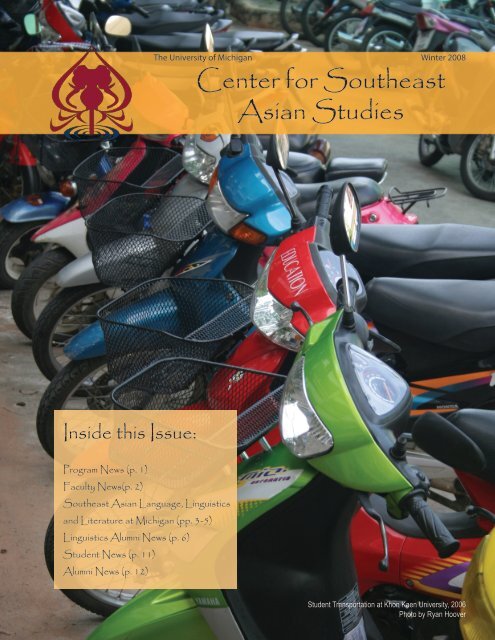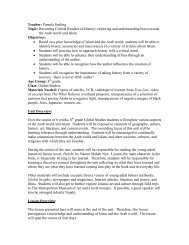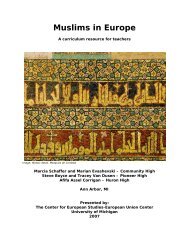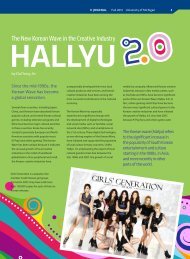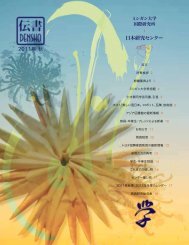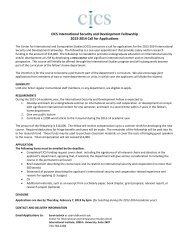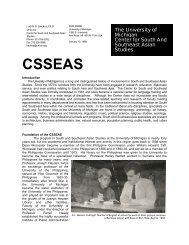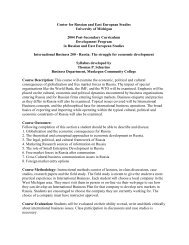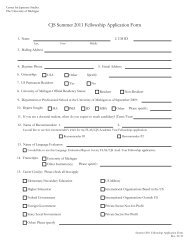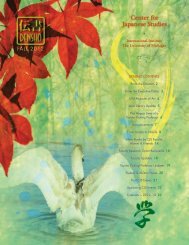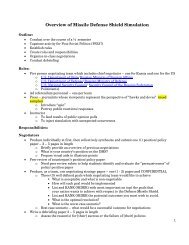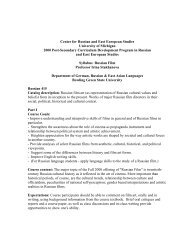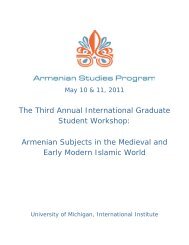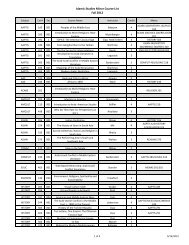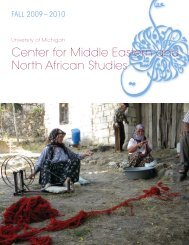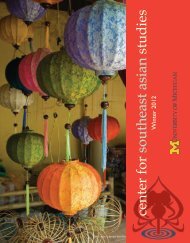Winter 2008 Newsletter - International Institute - University of Michigan
Winter 2008 Newsletter - International Institute - University of Michigan
Winter 2008 Newsletter - International Institute - University of Michigan
Create successful ePaper yourself
Turn your PDF publications into a flip-book with our unique Google optimized e-Paper software.
The <strong>University</strong> <strong>of</strong> <strong>Michigan</strong><br />
<strong>Winter</strong> <strong>2008</strong><br />
Center for Southeast<br />
Asian Studies<br />
Inside this Issue:<br />
Program News (p. 1)<br />
Faculty News(p. 2)<br />
Southeast Asian Language, Linguistics<br />
and Literature at <strong>Michigan</strong> (pp. 3-5)<br />
Linguistics Alumni News (p. 6)<br />
Student News (p. 11)<br />
Alumni News (p. 12)<br />
Student Transportation at Khon Kaen <strong>University</strong>, 2006<br />
Photo by Ryan Hoover
From CSEAS Director Pr<strong>of</strong>essor Linda Lim<br />
Our Focus in this <strong>Newsletter</strong><br />
is on our alumni<br />
in Southeast Asian Linguistics<br />
and Literature,<br />
who have made major<br />
contributions to the<br />
field in their research,<br />
teaching, and above<br />
all, their academic and<br />
pr<strong>of</strong>essional leadership<br />
and entrepreneurship.<br />
It has been most rewarding for me to interact<br />
with those who generously provided<br />
their time, their bios, photos and news<br />
<strong>of</strong> each other, especially as many <strong>of</strong> them<br />
were my own graduate student contemporaries<br />
at <strong>Michigan</strong>. The exercise also<br />
gave us the opportunity to review the<br />
signal contributions <strong>of</strong> our own faculty to<br />
the scholarly field, and more importantly,<br />
to the pr<strong>of</strong>essional and personal lives <strong>of</strong><br />
their graduate students.<br />
And we note with pride the ongoing<br />
contributions <strong>of</strong> our alumni from Southeast<br />
Asia who returned to help develop<br />
the academic capacities <strong>of</strong> their home nations,<br />
as researchers, teachers and artists,<br />
both in academia and in the public lives<br />
<strong>of</strong> their countries.<br />
The semester just past has been notable<br />
not just for our usual slew <strong>of</strong> lectures<br />
and other events (which can be viewed<br />
on our new website www.ii.umich.edu/<br />
cseas), but also for the memorable visits<br />
The Center also just underwent an external<br />
review, the results <strong>of</strong> which were very<br />
positive. Looking ahead, I will be taking a<br />
hiatus from the Director’s position for my<br />
sabbatical, leaving the Center in the capable<br />
hands <strong>of</strong> Allen Hicken, who will serve<br />
as Interim Director. In the meantime, both<br />
Allen and I will be participating in a major<br />
all-<strong>University</strong> <strong>of</strong> <strong>Michigan</strong> alumni event<br />
in Bangkok in June, the first <strong>of</strong> what we<br />
hope will be other such events elsewhere<br />
in the region in future. Also a first this<br />
summer are undergraduate study-tours<br />
“I will be taking a hiatus from the Director’s<br />
position for my sabbatical, leaving the Center<br />
in the capable hands <strong>of</strong> Allen Hicken, who will<br />
serve as Interim Director.”<br />
As space permits, we will focus in future<br />
issues on faculty and alumni in other<br />
fields, but our absolute and relative numbers<br />
and collective contributions must<br />
be greatest in Southeast Asian language<br />
and literature. Given that academic jobs<br />
in this field are few and far between, I’m<br />
particularly impressed at the diverse<br />
ways that our alumni have managed to<br />
turn their training and scholarship into<br />
other fields <strong>of</strong> endeavor, both within and<br />
outside <strong>of</strong> higher education—showing<br />
us all that there is indeed life, success and<br />
happiness for Ph.D.s outside the ivory<br />
tower! Equally impressive are those who<br />
managed to continue with their Southeast<br />
Asian literary and linguistic passions<br />
outside <strong>of</strong> their pr<strong>of</strong>essional employment.<br />
<strong>of</strong> the Indonesian and Thai Ambassadors,<br />
and for the many cultural and culinary<br />
activities <strong>of</strong> our Southeast Asian-national<br />
student groups, which are ever-expanding<br />
in number, scope and ambition. Our<br />
Spring gamelan concert and end-<strong>of</strong>-year<br />
party celebrated the long and impressive<br />
career in ethnomusicology <strong>of</strong> former<br />
Center Director Judith Becker. We wish<br />
Judith a well-earned retirement and look<br />
forward to her continued involvement<br />
in the Center, following in the footsteps<br />
<strong>of</strong> our other retired faculty who remain<br />
incredibly active in research, teaching<br />
and traveling.<br />
for students from throughout the university<br />
to all four countries whose languages<br />
we teach—Indonesia, Philippines, Thailand<br />
and Vietnam. More on these exciting<br />
opportunities in our Fall newsletter.<br />
Thank you as always for your interest and<br />
support. We are particularly grateful to<br />
the Thai Embassy for its continued generous<br />
support for our faculty research on,<br />
and administrative and student travel to,<br />
Thailand.<br />
With best wishes,<br />
Linda Lim, Director<br />
Center for Southeast Asian Studies<br />
1080 S. <strong>University</strong>, Ste. 3603<br />
Ann Arbor, MI 48109-1106<br />
734.764.0352 (Phone)<br />
734.936.0996 (Fax)<br />
www.ii.umich.edu/cseas<br />
Regents <strong>of</strong> the <strong>University</strong><br />
Julia Donovan Darlow, Ann Arbor<br />
Laurence B. Deitch, Bingham Farms<br />
Olivia P. Maynard, Goodrich<br />
Rebecca McGowan, Ann Arbor<br />
Andrea Fischer Newman, Ann Arbor<br />
Andrew C. Richner, Grosse Pointe Park<br />
S. Martin Taylor, Grosse Pointe Farms<br />
Katherine E. White, Ann Arbor<br />
Mary Sue Coleman (ex <strong>of</strong>ficio)<br />
The <strong>University</strong> <strong>of</strong> <strong>Michigan</strong>, as an equal opportunity/affirmative action employer, complies with all applicable federal and state laws regarding nondiscrimination<br />
and affirmative action, including Title IX <strong>of</strong> the Education Amendments <strong>of</strong> 1972 and Section 504 <strong>of</strong> the Rehabilitation Act <strong>of</strong> 1973. The<br />
<strong>University</strong> <strong>of</strong> <strong>Michigan</strong> is committed to a policy <strong>of</strong> nondiscrimination and equal opportunity for all persons regardless <strong>of</strong> race, sex*, color, religion, creed,<br />
national origin or ancestry, age, marital status, sexual orientation, disability, or Vietnam-era veteran status in employment, educational programs and<br />
activities, and admissions. Inquiries or complaints may be addressed to the Senior Director for Institutional Equity and Title IX/Section 504 Coordinator,<br />
Office <strong>of</strong> Institutional Equity, 2072 Administrative Services Building, Ann Arbor, <strong>Michigan</strong> 48109-1432, 734-763-0235, TTY 734-647-1388. For other <strong>University</strong><br />
<strong>of</strong> <strong>Michigan</strong> information call 734-764-1817.
Program News<br />
1<br />
Indonesian Ambassador<br />
Sudjadnan<br />
at the Asia Business<br />
Conference<br />
Indonesian Ambassador<br />
to the United<br />
States Sudjadnan<br />
Parnohadiningrat<br />
visited Ann Arbor<br />
in February, occasioning<br />
a weekend<br />
<strong>of</strong> Indonesiacentered<br />
activities<br />
on campus. The<br />
Ambassador gave<br />
the keynote address<br />
at the Ross School’s<br />
18th Annual Asia<br />
Business Conference<br />
which explored the<br />
theme <strong>of</strong> “Challenges<br />
to Asia’s Growth” Ambassador Sudjadnan’s<br />
talk on “Growth and Interdependence<br />
in Asia,” discussed the increase <strong>of</strong><br />
trade and investment within the region,<br />
and his comments on ASEAN economic<br />
Indonesian Ambassador Visits U-M<br />
cooperation and US-ASEAN economic<br />
relations were widely appreciated.<br />
The visit was Pak Sudjadnan’s first visit<br />
to the university, and he was accompanied<br />
by staff from both the Embassy in<br />
Washington and the Consulate General<br />
in Chicago. The Ambassador met with<br />
faculty and students specializing in Indonesian<br />
studies to discuss the <strong>University</strong>’s<br />
academic program and ongoing research<br />
initiatives, and to brainstorm about ways<br />
to help increase American knowledge <strong>of</strong><br />
and engagement with Indonesia.<br />
As part <strong>of</strong> that effort, the Ambassador<br />
held a closed-door session with the<br />
twenty Knight-Wallace journalism fellows<br />
in residence at the <strong>University</strong>. CSEAS<br />
Director Linda Lim, also in attendance,<br />
characterized the discussion as “frank,<br />
insightful, and useful” for the pr<strong>of</strong>essional<br />
Sompop Jantraka Awarded Wallenberg Medal<br />
journalists who, with one exception,<br />
had little experience and knowledge <strong>of</strong><br />
Indonesia. Pak Sudjadnan and his <strong>of</strong>ficers<br />
also met with members <strong>of</strong> PERMIAS, the<br />
Indonesian Students organization, and<br />
with Indonesian citizens from across<br />
<strong>Michigan</strong> and Northern Ohio.<br />
The staff from the Consulate General<br />
remained in town for one night after the<br />
Ambassador’s departure. They attended<br />
the PERMIAS Indonesian Cultural Night,<br />
<strong>of</strong> which the Consulate was a principal<br />
sponsor. The evening featured a delicious<br />
Indonesian dinner and a cultural tour <strong>of</strong><br />
the archipelago, with dance performances<br />
by visiting artists Bambang Irawan<br />
and Noor Farida Ramahlina. Mas Bambang<br />
and Mbak Lina, who were visiting<br />
pr<strong>of</strong>essors at <strong>Michigan</strong> in 2001-2002, are<br />
currently artists in residence at Cal Arts in<br />
Los Angeles.<br />
Prominent Thai anti-trafficking activist Sompop Jantraka received<br />
the <strong>University</strong>’s Wallenberg Medal on March 13, <strong>2008</strong>, in<br />
a ceremony at Rackham Auditorium attended by both U-M Provost<br />
Theresa Sullivan and Thai Ambassador to the United States<br />
Krit Garnjana-Goonchorn. Although Ambassador Krit had just<br />
visited Ann Arbor in October 2007, when he and his staff met<br />
with faculty, students and business leaders, he gladly returned<br />
to town to thank Sompop for his work and the <strong>University</strong> for<br />
what he called “this internationally prestigious honor accorded<br />
Khun Sompop.”<br />
The Wallenberg Medal is one <strong>of</strong> the <strong>University</strong> <strong>of</strong> <strong>Michigan</strong>’s<br />
highest awards, bestowed annually on an outstanding humanitarian.<br />
Recipients are selected because their contributions, in<br />
the form <strong>of</strong> actions and/or writing, honor and perpetuate Raoul<br />
Wallenberg’s own extraordinary accomplishments and human<br />
values. The concept <strong>of</strong> humanitarianism, demonstrated by Wallenberg<br />
on behalf <strong>of</strong> Jews in Nazi-occupied Europe, is intended<br />
to encompass the defense and rescue <strong>of</strong> all groups <strong>of</strong> human<br />
beings who are subject to exploitation and persecution.<br />
For over fifteen years, Sompop has worked tirelessly to save<br />
children in Asia’s Mekong sub-region from being sold into prostitution.<br />
In 1989, he founded the Development and Education<br />
Programme for Daughters and Communities (DEPDC). DEPDC<br />
works with impoverished children by providing shelter, education<br />
and various outreach activities (including a well-developed<br />
swimming program). Since its inception, DEPDC helped prevent<br />
thousands <strong>of</strong> children from succumbing to the sex industry<br />
or other exploitative child labor situations. Sompop’s efforts<br />
earned him two Nobel Peace Prize nominations and a pr<strong>of</strong>ile as<br />
an Asia Hero in Time Magazine. With few resources and many<br />
enemies, Sompop remains a strong force in the fight against<br />
human trafficking, and an excellent example <strong>of</strong> Thai activists<br />
and NGOs helping to engage and find solutions to problems<br />
affecting the whole region.<br />
The medal<br />
ceremony was<br />
the climax <strong>of</strong><br />
Sompop’s sixday-long<br />
visit in<br />
Ann Arbor, but<br />
it was hardly the<br />
only highlight.<br />
Sompop met<br />
with students<br />
at the <strong>University</strong>,<br />
lectured in<br />
CSEAS’ undergraduate<br />
course<br />
on Contemporary<br />
Social<br />
Sompop Jantraka with the Wallenberg Medal,<br />
flanked by Thai Ambassador Krit Garnjana-<br />
Goonchorn and Mrs. Ravewan Garnjana-<br />
Goonchorn<br />
Issues in Southeast Asia, and held discussions with graduate<br />
students at the Social Work and Law Schools. He spent a day in<br />
Tecumseh, <strong>Michigan</strong>, talking with seniors at Tecumseh Senior<br />
High School about leadership and community-based organizations<br />
for social and humanitarian change. Sompop was also<br />
interviewed for a documentary on the lasting effects <strong>of</strong> Peace<br />
Corps programs along with Rebecca Perham, the Peace Corps<br />
volunteer who first noticed Sompop when he was an indigent<br />
teenager on the streets <strong>of</strong> his hometown in Surat Thani province,<br />
brought him to school and taught him English.<br />
For his own college-age son Sitha (who accompanied Sompop<br />
to Ann Arbor, as did his wife, Dusadee and his daughter, Kaesai),<br />
the most fun part <strong>of</strong> the trip was being able to meet and<br />
swim alongside U-M student and Olympic champion Michael<br />
Phelps. To support his swimming program, which Sitha helps<br />
coach, Sompop has built the only regulation 50-meter pool in<br />
Northern Thailand at DEPDC, so the chance for Sitha to meet<br />
one <strong>of</strong> the world’s best swimmers and to work with the <strong>Michigan</strong><br />
coaches was a particular treat.
2<br />
Faculty News<br />
In addition to welcoming Allen Hicken as the interim CSEAS<br />
Director, we congratulate him on his slew <strong>of</strong> recent publications.<br />
First and foremost are his new book Building Party<br />
Systems in Developing Democracies, Cambridge <strong>University</strong> Press<br />
(<strong>2008</strong>), and a chapter, “Developing Democracies in Southeast<br />
Asia: Theorizing the Role <strong>of</strong> Parties and Elections,” in Erik Kuhonta,<br />
Daniel Slater, and Tuong Vu, eds., Southeast Asia and Political<br />
Science: Theory, Region, and Method, Stanford <strong>University</strong> Press<br />
(<strong>2008</strong>). Beyond that he has at least eight articles on subjects<br />
such as voting and education, electoral corruption, political<br />
engineering and party regulation, the politics <strong>of</strong> economic upgrading,<br />
and the politics <strong>of</strong> economic recovery, either recently<br />
in print or at press in journals that include American Journal <strong>of</strong><br />
Political Science, Asian Survey, Journal <strong>of</strong> East Asian Studies, Journal<br />
<strong>of</strong> Politics and Crossroads. ahicken@umich.edu<br />
Having retired, Judith Becker will now have time to<br />
cultivate her garden.<br />
After over forty years <strong>of</strong> inspired scholarship, dedicated<br />
teaching, devoted mentoring <strong>of</strong> her students and building<br />
a nationally and internationally prominent program in<br />
Javanese gamelan and performing arts, Judith Becker has<br />
retired from her position as Glenn McGeoch Collegiate Pr<strong>of</strong>essor<br />
<strong>of</strong> Music. She was fêted by colleagues and friends at a<br />
reception in her honor at the <strong>International</strong> <strong>Institute</strong> on April<br />
16, where tributes from her former students around the<br />
world were read. Our Fall <strong>2008</strong> newsletter will feature a pr<strong>of</strong>ile<br />
<strong>of</strong> Judith, her scholarship and legacy, including excerpts<br />
from the testimonials read at the reception. We are still glad<br />
to accept your appreciations <strong>of</strong> Judith, so please feel free to<br />
send them to Cindy Middleton at csmiddle@umich.edu. You<br />
can reach Judith directly at beckerj@umich.edu.<br />
Ashu Varshney recently received two prestigious national<br />
awards in one week, both to support his research on ethnocommunal<br />
violence. He received a <strong>2008</strong> Guggenheim Fellowship<br />
to support his work on “Cities and Ethnic Conflict: a<br />
Multi-country Study,’’ which will analyze ethnic conflict in 15<br />
cities from four countries: Indonesia, Nigeria, Malaysia and<br />
Sri Lanka. Ashu has also been named as one <strong>of</strong> twenty new<br />
Carnegie Scholars by the Carnegie Corporation <strong>of</strong> New York, as<br />
part <strong>of</strong> a program <strong>of</strong> grants to enrich public discourse on Islam.<br />
Ashu’s project for the Carnegie Corporation is entitled “Ethnocommunal<br />
conflict, civil society and the state.” The program is<br />
designed, according to Carnegie Corporation President Vartan<br />
Gregorian, to cultivate “a diverse scholarly community spanning<br />
a range <strong>of</strong> disciplines with the expectation that their voices<br />
will help Americans develop a more complex understanding<br />
<strong>of</strong> Muslim societies here and throughout the world—revealing<br />
Islam’s rich diversity.” Ashu’s project gathering data from<br />
regional and local sources in Indonesia enters a new phase<br />
this summer under the sponsorship <strong>of</strong> the World Bank. His coinvestigator,<br />
Pr<strong>of</strong>. Rizal Panggabean <strong>of</strong> Gajah Mada <strong>University</strong> in<br />
Yogyakarta, will join Ashu and his team in Ann Arbor this May.<br />
varshney@umich.edu<br />
John Knodel along with Jiraporn Kespichayawattana, Suvinee<br />
Wiwatwanich and Chanpen Saengtienchai have recently<br />
published “Migration and Intergenerational Solidarity: Evidence<br />
from Rural Thailand.” The publication examines the impact <strong>of</strong><br />
out-migration from rural areas in Thailand on intergenerational<br />
solidarity. With increasing migration <strong>of</strong> young adults from rural<br />
areas to the towns and cities, Thailand <strong>of</strong>fers an interesting case<br />
to examine the implications <strong>of</strong> migration for maintenance <strong>of</strong><br />
relationships among family members <strong>of</strong> different generations.<br />
John gave a Friday-at-Noon lecture on the subject in November.<br />
jknodel@umich.edu<br />
Henry Wright reports that he was part <strong>of</strong> a team which just<br />
published a lengthy monograph on a region culturally rooted<br />
in Southeast Asia: Early State Formation in Central Madagascar:<br />
An Archaeological Survey <strong>of</strong> Western Avaradrano, Museum <strong>of</strong> Anthropology<br />
Memoir No. 43. Ann Arbor: <strong>University</strong> <strong>of</strong> <strong>Michigan</strong><br />
Museum <strong>of</strong> Anthropology. hwright@umich.edu<br />
CSEAS Center Associate Catherine Hindman Reischl, Clinical<br />
Assistant Pr<strong>of</strong>essor <strong>of</strong> Educational Practice and Faculty Leader<br />
<strong>of</strong> Elementary Teacher Education, received the <strong>2008</strong> Rackham<br />
Master’s Mentoring Award. creischl@umich.edu<br />
With graduate students Lee Ann Wang, Jason Gavilan, Brian<br />
Chung, and Navaneetha Mokkil-Maruthur, Sarita See received<br />
funding from the Office <strong>of</strong> the Vice President for Research and<br />
Rackham for a Distinguished Faculty and Graduate Student<br />
Seminar “Global/Local Contradictions: Movements and Identifications<br />
in Asian and Asian American Studies,” which sponsored<br />
a series <strong>of</strong> lectures and colloquia in 2007-<strong>2008</strong>. Sarita has also<br />
been jet-setting to various universities around the U.S. giving<br />
lectures on such subjects as cultures <strong>of</strong> the Philippine diaspora<br />
and Filipino-American postcoloniality. She presented “Racial<br />
Trembling and the Object <strong>of</strong> Possession: Video Works by Angel<br />
Shaw, Paul Pfeiffer, and Patty Chang” at the Association <strong>of</strong> Asian<br />
American Studies (AAAS) annual meeting, in Chicago in April<br />
<strong>2008</strong>, and will present a paper on “’Five dollars per letter…two<br />
dollars fifty cents a day’: Carlos Bulosan, Seasonal Labor, and<br />
the Wages <strong>of</strong> Romance” at the Eighth <strong>International</strong> Conference<br />
on Philippine Studies (ICOPHIL), in Quezon City, Philippines, in<br />
July <strong>2008</strong>. ssee@umich.edu
Southeast Asian Language, Linguistics and Literature at <strong>Michigan</strong><br />
3<br />
As the Center for Southeast Asian Studies approaches the upcoming<br />
50th anniversary <strong>of</strong> our founding in 1961, we hope to<br />
take the time in our newsletters to reflect back. When alumni<br />
more than ten years out <strong>of</strong> Ann Arbor return to find us in our<br />
new suite <strong>of</strong> <strong>of</strong>fices in the very modern <strong>International</strong> <strong>Institute</strong>,<br />
many invariably become nostalgic about the “good old days in<br />
Lane Hall,” where faculty and students packed into the crowded<br />
basement room for Friday lectures and visitors seeing people<br />
sitting on the tatami in the front lobby could be rightfully excused<br />
for being surprised that the language they heard being<br />
spoken was not Japanese, but rather Indonesian or Thai.<br />
Language is at the core <strong>of</strong> all area<br />
studies, and with language acquisition,<br />
there is always a need for<br />
good teaching. Nostalgia for Lane<br />
Hall aside, when CSEAS alumni<br />
speak <strong>of</strong> their experiences here,<br />
much <strong>of</strong> what they talk about is<br />
their strong relationships with their<br />
teachers and mentors. Southeast<br />
Asian Studies at <strong>Michigan</strong> has been<br />
very fortunate to have been an<br />
early source <strong>of</strong> instruction on the<br />
major Southeast Asian languages,<br />
provided by a committed and<br />
talented faculty who has inspired<br />
generations <strong>of</strong> students. Bill Gedney<br />
started the teaching <strong>of</strong> Thai in<br />
1960, while Netherlands Visiting<br />
Pr<strong>of</strong>essor Hans Teeuw inaugurated<br />
Indonesian in 1963, and was followed<br />
by Alan Stevens, and then<br />
Alton (Pete) Becker. Becker’s first<br />
Ph.D. student, Paz Buenaventura<br />
Naylor, inaugurated the teaching<br />
<strong>of</strong> Tagalog (Filipino) in 1977, and<br />
Vietnamese was introduced in 1992<br />
by Nguyen Thi Nga.<br />
Beyond the teaching <strong>of</strong> languages,<br />
the <strong>Michigan</strong> scholars we pr<strong>of</strong>ile<br />
Clockwise t: Paz Naylor, Bill Gedney, Rob Burling,<br />
Pete Becker<br />
on the following pages —Pete Becker, Rob Burling, Bill Gedney<br />
and Paz Naylor — conducted pioneering research, including<br />
intensive fieldwork, on Southeast Asian languages, linguistics<br />
and literature, and related historical, cultural and social subjects.<br />
Their many dedicated Ph.D. students have continued this<br />
work and disseminated it, not only through their own individual<br />
teaching and research, but also through their academic<br />
entrepreneurship at other institutions.<br />
John Hartmann and Patricia Henry have contributed much to<br />
the development <strong>of</strong> Northern Illinois <strong>University</strong>’s Center for<br />
Southeast Asian Studies as a major location for publications<br />
on Southeast Asian linguistics. Together with colleagues in<br />
computer science and languages, and growing from a pioneering<br />
computer-aided instruction project at U-M, headed by Rob<br />
Burling and Pete Becker, they have developed SEAsite, an online<br />
resource for seven major Southeast Asian languages and<br />
cultures, www.seasite.niu.edu , funded by the U.S. Department<br />
<strong>of</strong> Education. Tom Hudak and Karen Adams also developed<br />
a linguistics publications series at Arizona State <strong>University</strong>’s Program<br />
in Southeast Asian Studies.<br />
Tom Gething was instrumental in establishing the Southeast<br />
Asian Studies Summer <strong>Institute</strong> (SEASSI), a summer-intensive<br />
language consortium inaugurated at <strong>Michigan</strong> in 1983, which<br />
rotated through several other universities and is now at the<br />
<strong>University</strong> <strong>of</strong> Wisconsin-Madison, where Bob Bickner serves<br />
as its Language Director. Bob and Patcharin Peyasantiwong<br />
started the Consortium for the Advanced Study <strong>of</strong> Thai (CAST)<br />
which runs in-country summer language training at Chiang Mai<br />
<strong>University</strong>. Tom Gething later took over administration <strong>of</strong> CAST,<br />
now headquartered at the <strong>University</strong> <strong>of</strong> Washington-Seattle,<br />
while Bob and Patcharin established the <strong>University</strong> <strong>of</strong> Wisconsin’s<br />
College Year in Thailand program, now in its 25th year.<br />
<strong>Michigan</strong> has long been an interdisciplinary<br />
place, so it is not unusual<br />
perhaps that even as linguistics and<br />
the study <strong>of</strong> languages and the<br />
histories and cultures that surround<br />
them increasingly diverge, scholars<br />
at <strong>Michigan</strong> have <strong>of</strong>ten been interested<br />
in both, reflecting long-time<br />
hybrid interests <strong>of</strong> their teachers. This<br />
interest continues with our current<br />
students. Linguistics doctoral student<br />
Eric Brown is interested in questions<br />
<strong>of</strong> language contact and change, particularly<br />
in Tai-Kadai languages and<br />
in studying language attrition among<br />
Lao immigrants and their children in<br />
California, while Anthropology doctoral<br />
student Hillary Brass is interested<br />
in language shift markers and the<br />
colloquial use <strong>of</strong> English as it is intersluiced<br />
with modern Indonesian.<br />
Quite a few recent CSEAS Masters<br />
theses have focused on language and<br />
literature. Rebekah Linh Collins wrote<br />
about the “Viet Nam/American War in<br />
Vietnamese Poetry” in 2003, Shawn<br />
Callanan’s 2006 exploration <strong>of</strong> the<br />
language <strong>of</strong> Indonesian nationalism in<br />
the writings <strong>of</strong> Mas Marco is entitled<br />
“Mata Gelap, Crossing Language,” and Jack Merchant explored<br />
the historical context <strong>of</strong> Nguyen Du’s Tale <strong>of</strong> Kieu in 2007. All<br />
three have continued on to doctoral programs, where their<br />
research continues.<br />
With this <strong>Newsletter</strong> Focus, we are pleased and proud to<br />
celebrate the achievements, both in and outside <strong>of</strong> academia,<br />
<strong>of</strong> our past faculty and alumni in Southeast Asian languages,<br />
linguistics and literature. We begin with pr<strong>of</strong>iles <strong>of</strong> four former<br />
faculty – Becker, Burling, Gedney, and Naylor – and continue<br />
with brief and surely incomplete listings <strong>of</strong> their doctoral students,<br />
<strong>of</strong> where they have gone on to work, and <strong>of</strong> some <strong>of</strong> the<br />
research they have published. Taken together, this corpus forms<br />
the bedrock <strong>of</strong> <strong>Michigan</strong>’s enduring contribution to the field <strong>of</strong><br />
Southeast Asian Studies in the United States, to which the dedication<br />
<strong>of</strong> these individuals has been, and remains, exemplary.<br />
Help on our former faculty bios was gratefully received from Karen<br />
Adams (for Pete Becker), Mary Bresnahan (for Paz Naylor), John<br />
Hartmann and Tom Hudak (for Bill Gedney), and Patricia Henry<br />
(for Rob Burling).<br />
continued on page 4
4<br />
Four Who Paved the Way: Pr<strong>of</strong>iles <strong>of</strong> Pete Becke<br />
Alton L. (Pete)<br />
Becker graduated<br />
with a B.A. in English<br />
from the <strong>University</strong><br />
<strong>of</strong> <strong>Michigan</strong><br />
(1954), then went<br />
to the <strong>University</strong> <strong>of</strong><br />
Connecticut for his<br />
M.A. (1956), returning<br />
to U-M for his<br />
Ph.D. (1967) which<br />
included field work<br />
in Burma from 1958-<br />
1961 under a Fulbright. He taught writing<br />
in the School <strong>of</strong> Engineering as a Department<br />
<strong>of</strong> English Instructor, later becoming<br />
a faculty member in the Department <strong>of</strong><br />
Linguistics. He served as Director <strong>of</strong> the<br />
Center for South and Southeast Asian<br />
Studies from 1972-73 and 1974-75.<br />
Pete’s dissertation, “A generative description<br />
<strong>of</strong> the English subject tagmemes,”<br />
showed the influence <strong>of</strong> his internationally<br />
known mentor, Kenneth L. Pike, as<br />
well as Pete’s lifelong interest in discourse<br />
analysis and text. Along with Pike and colleague<br />
Richard Young, Pete co-authored<br />
Rhetoric: Discovery and Change (1970),<br />
which has remained an influential book in<br />
the field; he and Young then inaugurated<br />
a new Ph.D. concentration in Rhetoric,<br />
Composition, & Linguistics at Arizona<br />
State <strong>University</strong>.<br />
Pete’s frequent fieldwork in Burma,<br />
Indonesia, Malaysia and Sri Lanka, led to<br />
a rare understanding <strong>of</strong> the particularity<br />
<strong>of</strong> different languages and <strong>of</strong> languaging,<br />
taking old texts and reshaping them into<br />
present contexts. Among his publications<br />
are “Repetition and Otherness: An Essay”<br />
in Johnstone, ed., Repetition in Discourse:<br />
Interdisciplinary Perspectives (1994) and<br />
“Culture Troping: A Dialogue Between<br />
A. L. Becker and Bruce Mannheim” in<br />
Tedlock and Mannheim, eds., The Dialogic<br />
Emergence <strong>of</strong> Culture (1995). His Beyond<br />
Translation: Toward Modern Philology<br />
(1995), a collection <strong>of</strong> many <strong>of</strong> his seminal<br />
essays, received the <strong>University</strong> <strong>of</strong> <strong>Michigan</strong><br />
Press Book Award. Pete was also an<br />
accomplished gamelan puppeteer, and he<br />
co-authored articles on Javanese gamelan<br />
with his wife Judith Becker, together<br />
inspiring a generation <strong>of</strong> ethnomusicologists<br />
and musicians deeply steeped in the<br />
Javanese performing arts.<br />
Pete’s contributions to the field <strong>of</strong> linguistics<br />
and Southeast Asian Studies included<br />
hosting events such as the <strong>International</strong><br />
Conference on Sino-Tibetan Languages<br />
and Linguistics, and participating in a<br />
Linguistic Society <strong>of</strong> America Summer<br />
<strong>Institute</strong> and SEASSI programs. He taught<br />
Old Javanese, other language and linguistics<br />
courses, mentored Ph.D. students with<br />
wide-ranging interests in text, language<br />
and context, and hosted numerous scholars<br />
from Southeast Asia and from Buddhist<br />
institutions, including Vidyadhara<br />
Chogyam Trungpa Rinpoche.<br />
Believing strongly in the importance <strong>of</strong><br />
dialogue, Pete was a fellow at the <strong>Institute</strong><br />
for Advanced Study, Princeton in 1982,<br />
and participated in the <strong>Michigan</strong> Society<br />
<strong>of</strong> Fellows. A conference organized by colleagues<br />
and students, “The Notion <strong>of</strong> Person:<br />
A Conference to Honor the Work <strong>of</strong><br />
Alton L. Becker” was held in May 1996, and<br />
published in Language Sciences 21 (1999),<br />
the wide variety <strong>of</strong> topics discussed<br />
reflecting the breadth <strong>of</strong> his intellectual<br />
impact in many fields. Pete and Judith live<br />
in Ann Arbor, and Pete has been sighted<br />
chuckling at the wayang sandosa performances<br />
held in Hill Auditorium in recent<br />
years, enjoying both the interplay <strong>of</strong><br />
languages and cultures, and the exposure<br />
<strong>of</strong> a new generation <strong>of</strong> U-M students to<br />
things that have enriched his life.<br />
William J. Gedney graduated from Whitman<br />
College, Washington, in 1935. He was<br />
a high school English teacher in Oregon and<br />
Washington, studying linguistics at various<br />
summer institutes until he was drafted during<br />
World War II and assigned to the Army<br />
Language Unit in New York City, where he<br />
worked on Thai language. He obtained his<br />
Ph.D., entitled “Indic Loanwords in Spoken<br />
Thai”, from Yale in 1947, then went to Thailand<br />
to continue his Thai language and literary<br />
studies. There, he started his collection <strong>of</strong> (eventually 14,000)<br />
Thai books and materials which he donated to the <strong>University</strong> <strong>of</strong><br />
<strong>Michigan</strong> in 1975.<br />
In 1960 Bill began teaching linguistics and Thai at <strong>Michigan</strong>,<br />
where he also developed language programs for the earliest<br />
Peace Corps training programs. For the next two decades, he<br />
conducted intensive research on more than 22 languages and<br />
dialects <strong>of</strong> the Tai language family. Published in eight lengthy<br />
volumes by the Center for South and Southeast Asian Studies at<br />
the <strong>University</strong> <strong>of</strong> <strong>Michigan</strong>, many were edited by Tom Hudak and<br />
Bob Bickner, two <strong>of</strong> his legions <strong>of</strong> devoted Ph.D. students. Bill<br />
continued his research after retiring in 1980 from the <strong>Michigan</strong><br />
Department <strong>of</strong> Linguistics, where he had served as Chair from<br />
1972-75. He served as President <strong>of</strong> the American Oriental Society<br />
in 1982, and was also active in the Linguistic Society <strong>of</strong> America,<br />
the Siam Society, the Association for Asian Studies, the Southeast<br />
Asian Linguistic Society, and the <strong>International</strong> Conference on<br />
Sino-Tibetan Languages and Linguistics. Bill died in Ann Arbor<br />
in November 1999, but his work lives on including in that <strong>of</strong> his<br />
students, only some <strong>of</strong> which is represented here.<br />
The following published works are selected to represent the<br />
breadth, depth, versatility and longevity <strong>of</strong> Bill’s scholarship: Life<br />
and Ritual in Old Siam (1961); “A Comparative Sketch <strong>of</strong> White,<br />
Black, and Red Tai,” Social Science Review (1964); “Thailand and<br />
Laos” in Sebeok, ed., Current Trends in Linguistics: Linguistics<br />
in East Asia and Southeast Asia (1967); “The Saek Language <strong>of</strong><br />
Nakhon Phanom Province,” Journal <strong>of</strong> the Siam Society (1970);<br />
“Notes on Tai Neua” in Gething, Harris and Kullavanijaya, eds., Tai<br />
Linguistics in Honor <strong>of</strong> Fang-kuei Li (1976); “On the Thai Evidence<br />
for Austro-Thai,” Computational Analyses <strong>of</strong> Asian and African<br />
Languages (1976); “Linguistic Diversity in Indochina” in Whitmore,<br />
ed., Introduction to Indochinese History, Culture, Language and Life<br />
(1979); “Confronting the Unknown: Tonal Splits and the Genealogy<br />
<strong>of</strong> Tai-Kadai” in Thurgood, Matis<strong>of</strong>f and Bradley, eds., Linguistics<br />
<strong>of</strong> the Sino-Tibetan Area (1985); “A Gallery <strong>of</strong> Picturesque<br />
Personalities”,in Bickner et al, eds., Papers From A Conference on<br />
Thai Studies in Honor <strong>of</strong> William J. Gedney (1986); “A Possible Early<br />
Thai Route to the Sea,” Journal <strong>of</strong> the Siam Society (1988); “Tai<br />
Names for the Ox” in Davidson, ed., Southeast Asian Linguistics:<br />
Essays in Honour <strong>of</strong> Eugenie J.A. Henderson (1989); “Comments on<br />
the Linguistic Arguments Relating to Inscription One” in Chamberlain,<br />
ed., The Ramkhamhaeng Controversy: Collected Papers<br />
(1991). A full listing is provided in Compton and Hartmann, eds.,<br />
Papers on Tai Languages, Linguistics and Literature: In Honor <strong>of</strong> William<br />
J. Gedney on his 77th Birthday (1992).
, Robbins Burling, Bill Gedney and Paz Naylor<br />
5<br />
Robbins Burling graduated with a B.A.<br />
from Yale in 1950 and Ph.D. in Anthropology<br />
from Harvard in 1958. He taught at<br />
the <strong>University</strong> <strong>of</strong> Pennsylvania from 1957<br />
to 1963, taking a leave <strong>of</strong> absence from<br />
1959-60 when he was a Fulbright Visiting<br />
Lecturer at the <strong>University</strong> <strong>of</strong> Rangoon<br />
in Burma. Rob came to the <strong>University</strong> <strong>of</strong><br />
<strong>Michigan</strong> in 1963 as Associate Pr<strong>of</strong>essor <strong>of</strong><br />
Anthropology, and was Pr<strong>of</strong>essor <strong>of</strong> Anthropology<br />
(serving as Chair from 1980-83) and Linguistics from<br />
1966 to 1995, when he retired as Pr<strong>of</strong>essor Emeritus, though this<br />
has certainly not marked the end <strong>of</strong> his scholarship.<br />
As reflects his dual appointment in Linguistics and Anthropology,<br />
Rob’s work concerns the structures <strong>of</strong> both language and culture.<br />
This is well seen in his scholarship on the Garo <strong>of</strong> Northeastern<br />
India and Burma, and on Tibeto-Burman linguistics, with work<br />
on subjects ranging from family structures and the language <strong>of</strong><br />
kinship [“Garo Avuncular Authority and Matrilateral Cross-Cousin<br />
Marriage,” (1958); “Garo Kinship Terms and the Analysis <strong>of</strong> Meaning,”<br />
(1968)], to the structures <strong>of</strong> Garo language [“Garo Spelling<br />
and Garo Phonology” (1981) and “Noun-Compounding in Garo”<br />
(1985) and “Garo as a Minimal Tone Language” (1992).]<br />
His other Southeast Asia work includes the classic Hill Farms and<br />
Padi Fields, Life in Mainland Southeast Asia (1965, 2nd edition<br />
1992); and work on Burman, again looking both at family structures<br />
[“Burmese Kinship Terminology,” (1965)] and languages<br />
[Proto-Lolo Burmese (1967); “Proto-Karen: A Reanalysis” (1969) and<br />
“The Historical Place <strong>of</strong> Jingphaw in Tibeto-Burman” (1971).]<br />
Rob’s interests were always wide-ranging, including writings<br />
on religion and politics [“Cognition and Componential Analysis:<br />
God’s Truth or Hocus-Pocus” (1964); The Passage <strong>of</strong> Power: Studies<br />
in Political Succession (1974)]. His interest in the teaching <strong>of</strong> language<br />
resulted in many publications, such as “Talking to Teachers<br />
about Social Dialects,” (1971); “Machine-Aided Instruction<br />
in Bahasa Indonesia” (with A.L. Becker, Patricia Henry and Joyce<br />
Tomasowa, 1981) and Learning a Field Language (1984).<br />
Rob continues to be very active in research and publication. He<br />
is engaged in fieldwork in India as this newsletter goes to press,<br />
and his requests to have his membership on CSEAS email lists<br />
turned on and <strong>of</strong>f as he leaves for the field and then returns<br />
home are as regular as the changing <strong>of</strong> the seasons. His most<br />
recent work continues to explore questions that have animated<br />
his interest for decades as he has published “Where did the Garos<br />
come from?” (2003); “Prosody is not Language,” (2003); and “Language,<br />
Ethnicity and Migration in North-Eastern India” (2007).<br />
A 1993 article “Primate Calls, Human Language and Nonverbal<br />
Communication”, in Current Anthropology foreshadowed his<br />
recent critically acclaimed book from Oxford Press, The Talking<br />
Ape: How Language Evolved (2005). Described by Oxbow as<br />
“one <strong>of</strong> the most approachable books on the development <strong>of</strong><br />
human language available,” the book traces language back to<br />
its origins among apes just pre-dating the establishment <strong>of</strong> human<br />
societies, examining the links between signs, sounds and<br />
meanings and exploring the “prehistories” <strong>of</strong> vocabulary and<br />
grammar, thereby helping us understand better the very nature<br />
<strong>of</strong> language and how it affects our thoughts and actions and our<br />
relationships with each other.<br />
Paz Buenaventura<br />
Naylor<br />
graduated with<br />
a B.A. in English<br />
(cum laude) from<br />
the <strong>University</strong> <strong>of</strong><br />
the Philippines in<br />
1950, and completed<br />
an M.A. in<br />
Linguistics in 1955<br />
from the <strong>University</strong><br />
<strong>of</strong> <strong>Michigan</strong>,<br />
where she was a<br />
Barbour Scholar. She obtained her Ph.D.<br />
in Linguistics, from <strong>Michigan</strong> in 1973.<br />
Her dissertation on “Topic, Focus and<br />
Emphasis in the Tagalog Verb Clause” was<br />
published in Oceanic Linguistics (1975).<br />
Paz’s extensive scholarly contributions<br />
resulted in many invitations to present<br />
her work at international conferences.<br />
She was also a visiting scholar at several<br />
institutions, including the London School<br />
<strong>of</strong> Oriental and African Studies (1988-<br />
89). In 1977 she set up at <strong>Michigan</strong> the<br />
first, and for eleven years, only Tagalog<br />
language program on the U.S. mainland.<br />
She taught all levels <strong>of</strong> Tagalog in the<br />
Department <strong>of</strong> Asian Languages and<br />
Cultures from 1986 until her retirement<br />
from teaching in 1994, when she was<br />
Adjunct Associate Pr<strong>of</strong>essor. Paz has also<br />
been extremely active in <strong>University</strong> and<br />
community circles, serving on many committees<br />
over the years, and receiving the<br />
“Outstanding Filipino Woman <strong>of</strong> the Year<br />
Scholastic Advancement”, award from the<br />
Filipino American Association and the<br />
<strong>International</strong> Women’s Forum in 1985.<br />
In 1979, Paz edited Austronesian Studies:<br />
Papers From The Second Eastern Conference<br />
On Austronesian Languages for the Center<br />
for South and Southeast Asian Studies’<br />
<strong>Michigan</strong> Papers on South and Southeast<br />
Asia series, also contributing a paper to<br />
the volume on “Linking, Relation-Marking<br />
and Tagalog Syntax”. Her numerous other<br />
publications include “Expressions <strong>of</strong> Irrealis<br />
in Some Philippine Languages,” <strong>University</strong><br />
<strong>of</strong> <strong>Michigan</strong> Publications in Linguistics<br />
(1978); “Toward Focus in Austronesian”<br />
in Wurm and Carrington, eds., Second<br />
<strong>International</strong> Conference on Austronesian<br />
Linguistics: Proceedings (1979); “The Pragmatics<br />
<strong>of</strong> Focus” and “On the Semantics<br />
<strong>of</strong> Reduplication” in Geraghty, Carrington,<br />
and Wurm, eds., FOCAL I: Papers From The<br />
Fourth <strong>International</strong> Conference On Austronesian<br />
Linguistics (1986); “Focus, Discourse<br />
Pragmatics, and Language Typology” in<br />
Bahner, Werner, Schildt and Viehweger,<br />
eds., Proceedings <strong>of</strong> the <strong>International</strong><br />
Congress Of Linguists (1991); “Subject,<br />
Topic, and Tagalog Syntax” in Bennett,<br />
Bynon, and Hewitt, eds., Subject, Voice<br />
And Ergativity (1995); and “On the Stative<br />
Predicate: Tagalog Existentials Revisited”<br />
in Liao and Rubino,eds., Current Issues In<br />
Philippine Linguistics And Anthropology:<br />
Parangal Kay Lawrence A. Reid (2006). Her<br />
book on Tagalog in the London Oriental<br />
and African Language Series is forthcoming<br />
from the John Benjamins Publishing<br />
Co., Amsterdam.<br />
Paz lives in Ann Arbor with her husband<br />
Barney, and continues to be actively<br />
involved in the life <strong>of</strong> the Center for<br />
Southeast Asian Studies. She has been a<br />
strong supporter <strong>of</strong> the Philippine Studies<br />
Endowment, and can <strong>of</strong>ten be found at<br />
the CSEAS Friday-at-Noon lecture series,<br />
always with a comment and an incisive<br />
question for the speaker at the talk’s<br />
conclusion.
6<br />
Linguistics, Language and Literature Alumni<br />
Southeast Asian Linguistics, Language and Literature:<br />
A Partial Listing <strong>of</strong> <strong>University</strong> <strong>of</strong> <strong>Michigan</strong> Ph.D.s<br />
Thai/Lao<br />
Karen Lee Adams, Ph.D. Linguistics 1982, wrote her dissertation<br />
on “Systems <strong>of</strong> Numeral Classification in the Mon-Khmer,<br />
Nicobarese and Aslian Subfamilies <strong>of</strong> Austroasiatic Southeast<br />
Asia” (Pacific Linguistics 1989). She is Pr<strong>of</strong>essor <strong>of</strong> Linguistics in<br />
the Department <strong>of</strong> English at Arizona State <strong>University</strong>, where<br />
she served as Director <strong>of</strong> the Program in Southeast Asian Studies.<br />
Publications include “The Influence <strong>of</strong> Non-Austroasiatic<br />
Languages on Numeral Classification in Austroasiatic,” Journal<br />
<strong>of</strong> the American Oriental Society. With Thomas Hudak, she edited<br />
3 volumes <strong>of</strong> Papers from the Annual Meeting <strong>of</strong> the Southeast<br />
Asian Linguistics Society (SEALS) 1992, 1996, and 1997, and is<br />
currently co-editing a volume on Lao Studies.<br />
KLAdams@asu.edu<br />
Leslie Beebe, Ph.D. Linguistics 1974, wrote her dissertation on<br />
“Socially Conditioned Variation in Bangkok Thai”, after studying<br />
happily with Bill Gedney for seven years. She is Pr<strong>of</strong>essor <strong>of</strong><br />
Linguistics and Education at Columbia <strong>University</strong>, where she<br />
has spent her entire career, and is now Director <strong>of</strong> the Applied<br />
Linguistics Program and a member <strong>of</strong> the TESOL program.<br />
A former President <strong>of</strong> the American Association for Applied<br />
Linguistics, she is Editor <strong>of</strong> Issues in Second Language Acquisition:<br />
Multiple Perspectives, co-author <strong>of</strong> English in the Cross-<br />
Cultural Era, and former Editor <strong>of</strong> the Forum for the Journal <strong>of</strong><br />
Intercultural Pragmatics . She has published in the areas <strong>of</strong> Thai<br />
linguistics, sociolinguistics, second language acquisition and<br />
discourse analysis (especially cross-cultural and acquisitional<br />
pragmatics). lmb33@columbia.edu<br />
for Thai Language, and is developing a reading text book for<br />
Thai based on authentic materials, funded by the U.S. Department<br />
<strong>of</strong> Education. rbickner@wisc.edu<br />
Theodora B<strong>of</strong>man, Ph.D. Linguistics 1978, wrote her dissertation<br />
on “The Poetics <strong>of</strong> the Ramakian”, published in 1984. She<br />
is now Pr<strong>of</strong>essor <strong>of</strong> Linguistics at Northeastern Illinois <strong>University</strong><br />
in Chicago, where she teaches courses in linguistics, and<br />
occasionally, Structure <strong>of</strong> Thai or Languages and Cultures <strong>of</strong><br />
Southeast Asia. Recently she has been using the techniques <strong>of</strong><br />
corpus linguistics to study Thai texts, specifically Thai popular<br />
music and the Ramakian. t-b<strong>of</strong>man@neiu.edu<br />
Trisilpa Boonkachorn, Ph.D. Comparative Literature 1990,<br />
wrote her dissertation on “Intertextuality in Thai literary and<br />
social contexts: A study <strong>of</strong> contemporary poets.” She is Associate<br />
Pr<strong>of</strong>essor and Chair <strong>of</strong> Women’s Studies at Chulalongkorn<br />
<strong>University</strong> in Thailand, and has written or edited several books<br />
in Thai. Her research is on women in Thai literature.<br />
Trisilpa.b@chula.ac.th<br />
James R. Chamberlain, Ph.D. Linguistics 1977, wrote his dissertation<br />
on “An Introduction to Proto-Tai Zoology”. He has<br />
spent more than 33 years in Laos and Thailand, and is currently<br />
living in Laos, where he is involved in projects with the WWF,<br />
ADB, UNICEF, World Bank and AED/ECO (<strong>University</strong> <strong>of</strong> Lund).<br />
His research interests include Historical Tai, Lao/Tai Literature,<br />
Ethnobiology, Biocultural Diversity Conservation, and Social<br />
Research. He published “Tai-Kadai arthropods: a preliminary<br />
biolinguistic investigation” (1997).<br />
Robert J. Bickner, Ph.D. Linguistics 1981, wrote his dissertation<br />
on “A Linguistic Introduction to a Thai Literary Classic.” He<br />
is Pr<strong>of</strong>essor and Chair <strong>of</strong> the<br />
<strong>University</strong> <strong>of</strong> Wisconsin’s<br />
Department <strong>of</strong> Languages<br />
and Cultures <strong>of</strong> Asia, teaching<br />
Thai language, literature<br />
and linguistics. He founded<br />
and directs the College<br />
Year in Thailand program,<br />
and has served for eight<br />
years as Language Director<br />
for the Southeast Asian<br />
Studies Summer <strong>Institute</strong>.<br />
His publications include<br />
An Introduction to the<br />
Thai Poem “Lilit Phra Law”<br />
(The Story <strong>of</strong> King Law);<br />
“Directional Modification<br />
in Thai Fiction: The Use <strong>of</strong><br />
The Bickner family (son Devin, Bob,<br />
daughter Angeline, and Patcharin) at<br />
Angeline’s graduation from high school in<br />
May 2007<br />
‘Come’ and ‘Go’ in Text Building”; “Cultural Variation in Reflective<br />
Writing” (with Patcharin Peyasantiwong) and “Reflections on a<br />
Literary Dispute Between Jit Phumisak and Phra Worawetphisit.”<br />
He is currently working on an annotated translation <strong>of</strong> “Lilit<br />
Phra Law” from Thai to English, an Authoritative Text <strong>of</strong> “Lilit<br />
Phra Law” (Thai), and Oral Pr<strong>of</strong>iciency Assessment Guidelines<br />
Carol J. Compton, Ph.D. Linguistics 1977, wrote her dissertation<br />
on “Linguistic and Cultural Aspects <strong>of</strong> Lam: The Song <strong>of</strong><br />
the Lao Mohlam.” She taught the Lao language at the<br />
<strong>University</strong> <strong>of</strong> Wisconsin-Madison and Northern Illinois<br />
<strong>University</strong>. With John Hartmann, she edited Papers<br />
on Tai Languages, Linguistics and Literatures in Honor<br />
<strong>of</strong> William J. Gedney on his 77th Birthday (1992). “Four-<br />
Word Phrases in Lao Discourse” and “Use <strong>of</strong> Pronoun<br />
and Kinship Terms in Lao Performance Texts” in Papers<br />
from the Twelfth Annual Meeting <strong>of</strong> the Southeast Asian<br />
Linguistics Society 2002 (2007), are recent publications<br />
<strong>of</strong> her research on Lao language and literature.<br />
parishcompton@charter.net<br />
Thomas W. Gething, Ph.D. Linguistics 1966, wrote his<br />
dissertation on “Some Aspects <strong>of</strong> Semantic Structure in<br />
Standard Thai”. He is an Affiliate Pr<strong>of</strong>essor <strong>of</strong> Asian Languages<br />
and Literature at the <strong>University</strong> <strong>of</strong> Washington-<br />
Seattle, where he is an Associate Dean <strong>of</strong> The Graduate<br />
School and Director <strong>of</strong> the Office <strong>of</strong> Postdoctoral Affairs.<br />
Tom has taught at <strong>Michigan</strong>, Hawaii and Ohio <strong>University</strong>, and<br />
was instrumental in the establishment <strong>of</strong> the Consortium for<br />
the Advanced Study <strong>of</strong> Thai. With funding from the US Department<br />
<strong>of</strong> Education and the Title VI language and area centers,<br />
he directs the Advanced Study <strong>of</strong> Thai program annually in<br />
Chiang Mai. He chairs the board <strong>of</strong> the Southeast Asian Stud-
7<br />
ies Summer <strong>Institute</strong>, which <strong>of</strong>fers intensive language training<br />
each summer in Southeast Asian languages. He has also<br />
served as Director <strong>of</strong> the Southeast Asia Studies Center at the<br />
<strong>University</strong> <strong>of</strong> Washington. His research is focused on the study<br />
<strong>of</strong> the Lao and Thai languages, and includes work on the Kham<br />
Muang dialect <strong>of</strong> the Lanna region <strong>of</strong> Thailand. His Thai Basic<br />
Reader (1978) remains a staple <strong>of</strong> the field for Thai language<br />
instruction. gething@u.washington.edu<br />
John Grima, Ph.D. Linguistics 1978, wrote his dissertation on<br />
“Categories <strong>of</strong> Zero Nominal Reference and Clausal Structure<br />
in Thai”. He has worked since 1981 as a hospital manager in<br />
Ogden, Utah, and teaches a health administration course on<br />
economics and health policy at Weber State <strong>University</strong>, where<br />
his wife Sunee (U-M MILS) is a librarian. John published “Avelar<br />
for alveolar substitution in Thai child language,” (1982),<br />
and contributed to the<br />
Festschrift for Bill Gedney<br />
(1992). He gave a paper<br />
at the Thai Studies conference<br />
at Northern Illinois<br />
<strong>University</strong> in Dekalb, in<br />
2005, on the way Southern<br />
Thai Muslims talk<br />
about Thai history on the<br />
internet, and maintains<br />
a blog on the Southern<br />
John Grima and family.<br />
Thai insurgency www.<br />
souththailand.org. Sunee and Rotsukhon Muangmaen (U-M<br />
History) published a Thai translation <strong>of</strong> Bart Ehrman’s Truth and<br />
Fiction in the Da Vinci Code, in 2006. j.grima@comcast.net<br />
John F. Hartmann, Ph.D. Linguistics 1976, wrote his dissertation<br />
on “The Linguistic and Memory Structure <strong>of</strong> Tai-Lue Oral<br />
Narrative,” published in 1985. With Carol Compton, he edited<br />
Papers on Tai Languages, Linguistics, and Literatures (1992), and<br />
with Patricia Henry and her husband Jim Henry, he has created<br />
web sites for Thai and minority Tai languages, Lao, Vietnamese,<br />
and Islam in Thailand as part <strong>of</strong> www.seasite.niu.edu. A 2000-03<br />
grant from the Henry Luce Foundation took him to Guangxi,<br />
Guichou and Yunnan for fieldwork on “The Origins <strong>of</strong> Thai Irrigated<br />
Rice Technology and Culture”, and a book chapter “Tai<br />
Participation in the Spread <strong>of</strong> Rice Agriculture in Asia” is forthcoming.<br />
John received a 2007-2009 NSF grant for “A Regional<br />
Approach to Spatial Analysis <strong>of</strong> Tai Toponyms in Southern China<br />
and Southeast Asia Using GIS” and “The Power to Name Places:<br />
Ban, Muang, Chiang, Viang, Nakon, Krung,” was published in<br />
2007. In 2005, he co-organized the First <strong>International</strong> Conference<br />
on Lao Studies held at NIU, and in 2006, co-founded the<br />
Center for Lao Studies n 2006 as an outcome <strong>of</strong> that conference.<br />
(www.laostudies.org). In 2006, John received a Presidential<br />
Teaching Pr<strong>of</strong>essor medal and a four-year monetary award<br />
from NIU. He married Peter Gosling’s student, Vilawan Chusuei,<br />
(deceased), while both were at <strong>Michigan</strong>. A son, John William,<br />
earned a Ph.D. in aerospace engineering (UIUC), and a daughter,<br />
Wanda Kay, has a Ph.D. in chemistry (MSU). A first grandchild<br />
is “forthcoming” in September <strong>2008</strong>.<br />
jhartman@niu.edu<br />
Thomas J. Hudak,<br />
Ph.D. Linguistics<br />
1981, wrote his dissertation<br />
on “The<br />
Indigenization <strong>of</strong><br />
Pali Meters in Thai,”<br />
which he published<br />
in 1990. Tom is<br />
Pr<strong>of</strong>essor, School <strong>of</strong><br />
Human Evolution<br />
and Social Change,<br />
Arizona State <strong>University</strong>,<br />
where he has<br />
been since 1988. His<br />
publications include<br />
Tom Hudak and Karen Adams both teach<br />
in the Program in Southeast Asian Studies<br />
at Arizona State <strong>University</strong>.<br />
several articles in the Journal <strong>of</strong> the American Oriental Society.<br />
Tom edited several volumes <strong>of</strong> William J. Gedney’s work, including<br />
glossaries, texts and translations, on the Tai dialects <strong>of</strong><br />
Lungming (1991), Yay (1991), Southwestern Tai (1994), central<br />
Tai (1995), Lue (1996) and Tai dialect studies (1997). He also<br />
edited phonetic versions <strong>of</strong> Cushing’s Shan-English Dictionary<br />
(2000) and Minot’s White Tai Dictionary (2001). With Robert Bickner<br />
and Patcharin Peyasantiwong, he contributed to and edited<br />
Papers from a Conference on Thai Studies in honor <strong>of</strong> William J.<br />
Gedney (1986), and with Karen Adams, he contributed to and<br />
edited Papers from the Second Annual Meeting <strong>of</strong> the Southeast<br />
Asian Linguistics Society (1994). He also published an annotated<br />
translation <strong>of</strong> The Tale <strong>of</strong> Prince Samuttakote: A Buddhist Epic<br />
(1993), and is currently completing an NSF-funded project on<br />
the Documentation and Archival-Digitization <strong>of</strong> Tai Linguistic<br />
Data. Thomas.Hudak@asu.edu<br />
Adrian S. Palmer, Ph.D. Linguistics 1971, published books<br />
on teaching Thai for the American <strong>University</strong> Alumni (AUA) in<br />
Thailand. He is now Associate Pr<strong>of</strong>essor <strong>of</strong> Linguistics at the<br />
<strong>University</strong> <strong>of</strong> Utah. His book with Lyle F. Bachman on Language<br />
Testing in Practice: Designing and Developing Useful Language<br />
Tests, published by Oxford <strong>University</strong> Press in 1997, won the<br />
Modern Language Association’s Kenneth W. Mildenberger Prize,<br />
and a companion volume on Language Assessment in Practice,<br />
will appear in <strong>2008</strong>. Seeking the Heart <strong>of</strong> Teaching, with Mary-<br />
Ann Christison, was published in 2007.<br />
apalmer@linguistics.utah.edu<br />
Patcharin Peyasantiwong, Ph.D. Linguistics 1981, wrote her<br />
dissertation on “A Study <strong>of</strong> Final Particles in Conversational<br />
Thai.” She teaches ESL for the Madison Metropolitan School<br />
District and is a senior lecturer and coordinator for the <strong>University</strong><br />
<strong>of</strong> Wisconsin’s summer Thai language program. She has<br />
served as field director <strong>of</strong> the Advanced Study <strong>of</strong> Thai program,<br />
and serves as a pedagogy expert for Thai materials development<br />
with the <strong>University</strong> <strong>of</strong> Maryland’s LangNet. Her publications<br />
include “Phonological Reduction <strong>of</strong> Some Final Particles<br />
in Modern Thai,” “A Note on the ‘Missing’ Part in the Thai Poem<br />
Mahaachaat Khamluang,” and “Evaluation and Exit Criteria for<br />
ESL Students: A Classroom Action Research Project.” She is part<br />
<strong>of</strong> a U.S. Department <strong>of</strong> Education project to create a reading<br />
textbook for Thai based on authentic materials.<br />
ppeyasan@wisc.edu<br />
continued on page 8
8<br />
Linguistics, Language and Literature Alumni<br />
Thai/Lao continued from page 7<br />
Mary Sautter Sarawit, Ph.D. Linguistics<br />
1973, wrote her dissertation on “The<br />
Proto-Tai Vowel System”, after which she<br />
taught linguistics at Naresuan <strong>University</strong><br />
in Phitsanulok. She is now Deputy Director<br />
and runs the language center <strong>of</strong> Naresuan<br />
<strong>University</strong> <strong>International</strong> College, and<br />
is a member <strong>of</strong> the Curriculum Committee<br />
for Setting Standards for Teaching Thai as<br />
a Foreign Language, headed by Tom Gething<br />
and Bob Bickner.<br />
msarawit@hotmail.com<br />
Thomas Scovel, Ph.D. Linguistics 1970,<br />
wrote his dissertation on “A Grammar <strong>of</strong><br />
Time in Thai”, after helping Bill Gedney<br />
collate data on Thai languages. Tom then<br />
spent seven years in Thailand, teaching<br />
at Chiangmai <strong>University</strong> and pursuing research<br />
on Thai aphasics sponsored by the<br />
Ford Foundation. For the past 25 years,<br />
Tom has been teaching at San Francisco<br />
State <strong>University</strong> and has also been active<br />
lecturing and consulting in Asia. His<br />
research and publications have focused<br />
mainly on the areas <strong>of</strong> second language<br />
acquisition, foreign language pedagogy,<br />
neurolinguistics and psycholinguistics,<br />
and in Fall 2007 he gave a lecture to the<br />
English Language <strong>Institute</strong> in Ann Arbor.<br />
Both <strong>of</strong> his children were born in Thailand,<br />
and he and his wife are raising two half-<br />
Thai grandchildren.<br />
tscovel@sfsu.edu<br />
Kingkarn Thepkanjana, Ph.D. Linguistics<br />
1986, wrote her dissertation on “Serial<br />
Verb Constructions in Thai”. She is Associate<br />
Pr<strong>of</strong>essor and Chair <strong>of</strong> the Department<br />
<strong>of</strong> Linguistics in the Faculty <strong>of</strong> Arts, Chulalongkorn<br />
<strong>University</strong>. Her many scholarly<br />
publications include:“Lexical Causatives in<br />
Thai” in Constructions in Cognitive Linguistics<br />
(2000); “A Cognitive Account to the<br />
Causative/Inchoative Alternation in Thai”<br />
in Cognitive and Non-Indo-European Languages<br />
(2003); and “Pragmatic inferencing<br />
in grammaticalization: a case study <strong>of</strong><br />
directional verbs in Thai” in Cognitive and<br />
Discourse Perspectives on Language and<br />
Language Learning (2005). Forthcoming<br />
first-author publications include: ”Directional<br />
verbs as success markers in Thai:<br />
another grammaticalization path” in The<br />
Tai-Kadai Languages; “The verb <strong>of</strong> giving<br />
in Thai and Mandarin Chinese as a case <strong>of</strong><br />
polysemy: a comparative study,” Language<br />
Sciences; “Resultative constructions with<br />
“implied-result” and “entailed result” verbs<br />
in Thai and English: a contrastive study,”<br />
Linguistics: An Interdisciplinary Journal <strong>of</strong><br />
Langauge Sciences.<br />
Kingkarn.T@chula.ac.th<br />
Indonesian<br />
Gail Dreyfuss, Ph.D. Linguistics 1977, wrote her dissertation on the search for language<br />
universals through the study <strong>of</strong> relativization in creole languages, while serving as Pete<br />
Becker’s Teaching Assistant. She taught English at IKIP Malang in Indonesia from 1977<br />
to 1979 (where her younger son Andy was born), linguistics at U-M Flint, Dearborn and<br />
Detroit in 1979-80, and the <strong>University</strong> <strong>of</strong> Wisconsin-Madison in 1980-81. She and her<br />
husband Jeff then opened an ESL school in Madison, before selling it in 1998 to move<br />
to Seattle, where Gail worked with a human-rights immigration law firm. In 2003 they<br />
moved to Chicago where Jeff and their older son Tony opened Metropolis C<strong>of</strong>fee. Gail is<br />
now a full-time lecturer in linguistics at Northeastern<br />
Illinois <strong>University</strong>, helps care for her granddaughters,<br />
and volunteers at Barack Obama’s national campaign<br />
headquarters. zysele@gmail.com<br />
Jeffrey Dreyfuss, Ph.D. Linguistics 1981, wrote<br />
his dissertation on “Modes <strong>of</strong> Text-Building in the<br />
Indonesian Story ‘Surabaya’ by Idrus”, and taught<br />
at <strong>University</strong> <strong>of</strong> Wisconsin-Madison for three years.<br />
Jeff and his wife Gail opened an English as a Second<br />
Language and Argumentation <strong>Institute</strong> in Madison<br />
which grew to be the largest single-location<br />
ESL school in the country. In 1998 they sold WESLI Gail and Jeff Dreyfuss<br />
(Wisconsin English Second Language <strong>Institute</strong>) and<br />
moved to Seattle, where Jeff taught Indonesian language<br />
at the <strong>University</strong> <strong>of</strong> Washington through 2003. Jeff and his older son Tony then<br />
started a c<strong>of</strong>fee house and roasteria in Chicago which was selected as Micro-roaster <strong>of</strong><br />
the year by Roastmagazine.com for 2007 and as one <strong>of</strong> America’s top cafes by Food and<br />
Wine, and has been featured on TV, Chicago newspapers, New York Post and London’s<br />
Evening Standard. Jeff says, “I’ve learned Brazilian Portuguese and am about to try to<br />
learn Amharic; Ethiopia is home to c<strong>of</strong>fee originally and has some <strong>of</strong> the world’s finest<br />
c<strong>of</strong>fees. I want to be able to speak to people in their own language and form relationships<br />
that will help improve the quality <strong>of</strong> life in c<strong>of</strong>fee-growing communities through<br />
micro-loans etc. So I hope to begin Direct Trade with growers by forming buying groups<br />
<strong>of</strong> independent roasters who are passionate about their products, so we can leverage<br />
pricing and shipping and to be able to buy container-loads at a time (250-300 bags <strong>of</strong><br />
green c<strong>of</strong>fee each bag weighing 70 kilos).” jeff@metropolisc<strong>of</strong>fee.com<br />
Catherine Fortin, Ph.D. Linguistics 2007, wrote her dissertation on “Indonesian Sluicing<br />
and Verb Phrase Ellipsis: Description and Minimalist Explanation,” which received a<br />
Distinguished Dissertation Award from the U-M Rackham School <strong>of</strong> Graduate Studies.<br />
Catherine developed her interest in the syntax and morphology <strong>of</strong> Austronesian languages<br />
while an M.A. student at the <strong>University</strong> <strong>of</strong> Pittsburgh, and pursued her research<br />
working with native Indonesian-speaking undergrads at <strong>Michigan</strong>, where she studied<br />
Indonesian with Margaretha (Menuk) Sudarsih. She is now Visiting Assistant Pr<strong>of</strong>essor<br />
<strong>of</strong> Linguistics at Carleton College in Northfield, Minnesota, and plans to delve into other<br />
areas <strong>of</strong> Indonesian syntax, including the ways in which focus is represented.<br />
cfortin@carleton.edu<br />
Patricia Henry, Ph.D. Linguistics 1981, wrote and published her dissertation on “The<br />
Arjuna Wiwaha, Sargas I-XIII, Text and Annotated Translation”. Since 1979 she has been<br />
teaching Indonesian language and literature, and Southeast Asian literature in translation,<br />
at Northern Illinois <strong>University</strong>. With John Hartmann and other colleagues, she<br />
has received many federal grants for developing web-based instruction and resources<br />
in Southeast Asian languages: www.seasite.niu.edu . Pat’s publications include: “The<br />
Writer’s Responsibility: A Preliminary Look at the Depiction and Construction <strong>of</strong> Indonesia<br />
in the Works <strong>of</strong> Pramoedya Ananta Toer” in Crossroads: An Interdisciplinary Journal<br />
<strong>of</strong> Southeast Asian Studies (1991); “FLIS: Audible computer-aided language learning for<br />
Southeast Asian Languages: observations after a year <strong>of</strong> use” in Papers from the First Annual<br />
Meeting <strong>of</strong> the Southeast Asian Linguistics Society 1991 (1992); Translations <strong>of</strong> “Interview<br />
with Ravana” by Yudhistira ANM Massardi and “The Mysterious Shooter Trilogy” by<br />
Seno Gumira Ajidarma, in Virtual Lotus: Modern Fiction <strong>of</strong> Southeast Asia (2002); and “The<br />
Poetics <strong>of</strong> the Old Javanese Ramayana: a comparison with the Sanskrit Bhattikavya,” in<br />
an Anthology <strong>of</strong> Critical Essays on Southeast Asia (forthcoming).<br />
phenry@niu.edu
9<br />
Thomas M. Hunter, Ph.D. Linguistics 1988, wrote his dissertation on “Balinese Language:<br />
Historical Background and Contemporary State”. He has served as Academic<br />
Director/Faculty Advisor for the Brattleboro, Vermont-based SIT’s Study Abroad Program<br />
in Bali, currently sharing the position with his wife, Dra. Ni Wayan Aryati, and as Director<br />
<strong>of</strong> the Indonesian Study Program <strong>of</strong> the Australian Consortium for In-Country Indonesian<br />
Studies, in Yogyakarta. His published translations <strong>of</strong> Old Javanese literature include<br />
The Weaverbirds, a translation <strong>of</strong> the historical novel by the late Y.B. Mangunwijaya<br />
(1991), Springs <strong>of</strong> Tears, Springs <strong>of</strong> Rage: Collected Poems <strong>of</strong> Frans Nadjira (1997) and Blossoms<br />
<strong>of</strong> Longing: Poems <strong>of</strong> longing and regret translated from the ancient Javanese (1998).<br />
His published theoretical articles include: “Indo as Other: Identity, Anxiety and Ambiguity<br />
in Salah Asuhan” (2002); “The Poetics <strong>of</strong> Grammar in the Javano-Balinese Tradition”<br />
(2007); “The Body <strong>of</strong> the King, Reappraising Singhasari Period Syncretism” (2007); “New<br />
Tools for Exploring the Role <strong>of</strong> Language in Early State Formation <strong>of</strong> South and Southeast<br />
Asia” (<strong>2008</strong>); and “Sanskrit in the Archipelago: Translation, Vernacularization and<br />
Translocal Identity” (<strong>2008</strong>). His current research is on the application <strong>of</strong> sociolinguistics<br />
methodology to diachronic studies <strong>of</strong> Southeast Asian history and literary cultures. He<br />
continues to work on a reader in Old Javanese literature, and on a monograph on the<br />
interaction <strong>of</strong> irrealis and the perfective verbal aspect in Old Javanese.<br />
csabali@indo.net.id or tomaryati@hotmail.com.<br />
Roger Mills, Ph.D. Linguistics 1975, wrote his dissertation on “Proto South Sulawesi and<br />
Proto Austronesian Phonology”. He moved from Ann Arbor to Saugatuck, <strong>Michigan</strong> in<br />
1990, where he enjoys retirement and continues to plug away at book-research on the<br />
languages <strong>of</strong> Eastern Indonesia (Leti and the Tanimbar area). rfmilly@msn.com<br />
Ronit Ricci, Ph.D. Comparative Literature 2006, wrote her dissertation on “Translating<br />
Convergence in South and Southeast Asia: The Islamic “Book <strong>of</strong> One Thousand Questions”<br />
in Javanese, Tamil and Malay”. She was a postdoctoral fellow at the <strong>Institute</strong> for<br />
Comparative Literature and Society at Columbia <strong>University</strong> in Fall 2007, and currently<br />
holds a postdoctoral fellowship at the Asia Research <strong>Institute</strong>, National <strong>University</strong> <strong>of</strong><br />
Singapore. arirr@nus.edu.sg<br />
Nancy Smith-Hefner, PhD Linguistics 1983, wrote her dissertation on “Language and<br />
Social Identity: Speaking Javanese in Tengger (Indonesia)”. Since 2001 she has been<br />
Associate Pr<strong>of</strong>essor <strong>of</strong> Anthropology and Director <strong>of</strong> Undergraduate Studies at Boston<br />
<strong>University</strong>, after serving as Assistant and then Associate Pr<strong>of</strong>essor <strong>of</strong> Linguistics and<br />
Anthropology at the <strong>University</strong> <strong>of</strong> Massachusetts in Boston from 1987 to 2001. She<br />
wrote Khmer American: Identity and Moral Education in a Diasporic Community, Berkeley:<br />
<strong>University</strong> <strong>of</strong> California Press (1999) and is now finishing a book manuscript, tentatively<br />
entitled Muslim Youth: Gender and Sexuality in Indonesia’s New Middle Class, funded by a<br />
National Endowment for the Humanities Fellowship. Her many journal articles include:<br />
“Women and Politeness: The Javanese Example.” Language in Society (1988); “A Social<br />
History <strong>of</strong> Language Change in Highland East Java,” Journal <strong>of</strong> Asian Studies (1989); “Language<br />
and Identity in the Education <strong>of</strong> Boston-Area Khmer,” Anthropology and Education<br />
Quarterly (1990); “Ethnicity and the Force <strong>of</strong> Faith: Christian Conversion Among Khmer<br />
Refugees,” Anthropological Quarterly (1994); “Reproducing Respectability: Sex and<br />
Sexuality among Muslim Javanese Youth,” Review <strong>of</strong> Indonesian and Malay Affairs (2006);<br />
“Muslim Women and the Veil in Post-Soeharto Java,” Journal <strong>of</strong> Asian Studies (2007);<br />
“Youth Language, Gaul Sociability, and the New Indonesian Middle Class,” Journal <strong>of</strong><br />
Linguistic Anthropology (2007). smhefner@bu.edu<br />
Malay<br />
Muhammad Haji Salleh, Ph.D. Literature<br />
1973, wrote his dissertation on “Tradition<br />
and Change in Malay-Indonesian Poetry”.<br />
He was Lecturer at the <strong>Institute</strong> <strong>of</strong> Malay<br />
Language, Literature and Culture at<br />
Universiti Kebangsaan Malaysia, where in<br />
1995 he became Pr<strong>of</strong>essor in the Department<br />
<strong>of</strong> Malay Letters and Director <strong>of</strong> the<br />
<strong>Institute</strong> <strong>of</strong> Malay World and Civilization.<br />
From 2000 to 2005, he was Pr<strong>of</strong>essor<br />
<strong>of</strong> Literature at Universiti Sains Malaysia.<br />
Muhammad is Malaysia’s National<br />
Laureate (Sasterawan Negara Malaysia),<br />
and has published poems, criticisms and<br />
literary theory in both Malay and English.<br />
His anthology <strong>of</strong> poems Perjalanan Si<br />
Tenggang II won the ASEAN Literary<br />
Award in 1977, and he also received the<br />
SEA Write Award in 1997 and the Southeast<br />
Asia Literary Award in 2001, among<br />
others. His more important works include<br />
“Tradition and Change in Contemporary<br />
Malay-Indonesian Poetry”; Pengalaman<br />
Puisi; Cermin Diri; Yang Empunya Ceritera:<br />
the Mind <strong>of</strong> the Malay Author; Beyond the<br />
Archipelago; Rowing Down Two Rivers;<br />
and Laughter and Romance in the Archipelago.<br />
He was Founder President <strong>of</strong><br />
the Translators’ Association <strong>of</strong> Malaysia<br />
(1978-1981) and has served for thirty<br />
years as Chief Editor <strong>of</strong> Tenggara, Journal<br />
<strong>of</strong> Southeast Asian Literature.<br />
www.muhammadhajisalleh.com<br />
mhs0042@gmail.com<br />
Mary Zurbuchen, Ph.D. Linguistics 1981, wrote her dissertation on “The Shadow Theater<br />
<strong>of</strong> Bali: Explorations in Language and Text”, and published The Language <strong>of</strong> Balinese<br />
Shadow Theater (1987). She worked for the Ford Foundation as education and cultural<br />
affairs <strong>of</strong>ficer based in Jakarta (1982-87) and New Delhi (1988-92), and as Southeast Asia<br />
Representative based in Jakarta (1992-2000). She was then Visiting Pr<strong>of</strong>essor at UCLA<br />
from 2000, and Acting Director <strong>of</strong> UCLA’s Center for Southeast Asian Studies in 2002-03,<br />
before joining the Ford Foundation <strong>International</strong> Fellowships Program <strong>of</strong>fice in New<br />
York, where she is Director <strong>of</strong> Asia and Russia Programs. She edited Beginning to Remember:<br />
The Past in the Indonesia Present (2005). mzurbuchen@yahoo.com<br />
continued on page 10
10<br />
Linguistics, Language and Literature Alumni<br />
Filipino<br />
Mary Bresnahan, Ph.D. Linguistics 1985, wrote her dissertation<br />
on “Finding our Feet: Elements <strong>of</strong> Culture in Amado Hernandez’<br />
Luha ng Buwaya”. She is Pr<strong>of</strong>essor <strong>of</strong> Communication at <strong>Michigan</strong><br />
State <strong>University</strong>, where since 1985 she has taught courses<br />
in intercultural, interethnic and interpersonal communication.<br />
Her many publications include: “Placeholding as a discourse<br />
property in Tagalog texts;” LACUS Forum (1991); “When a<br />
response is not an answer,” Multilingua (1991); Finding our feet:<br />
Understanding cross-cultural discourse (1991); “The construction<br />
<strong>of</strong> gender in Tagalog discourse,” LACUS Forum (1993); “Centering<br />
in Tagalog,” in Festschrift for Andrew Gonzalez (2000); and<br />
the first-authored articles, “Attitudinal and affective response<br />
toward accented English,” Language and Communication (2001);<br />
“Multi-trait-multi-method self-construal validity assessment in<br />
Korea, Japan, and the U. S.,” Human Communication Research<br />
(2005); “Players and whiners: Responses to the depiction <strong>of</strong><br />
gender in Japanese anime,” Asian Journal <strong>of</strong> Communication<br />
(2006); and “Reservations <strong>of</strong> the Spirit: The Development <strong>of</strong><br />
a Spiritual Beliefs Scale and its Relationship to Willingness to<br />
become an Organ Donor in Japan, Korea, and the U.S.,” Health<br />
Communication (2007). Mary received a new MSU award for<br />
teaching – the “Crystal Apple” – in <strong>2008</strong>.<br />
Bresnah1@msu.edu<br />
Ajarn Saeng <strong>of</strong> Chiang Mai<br />
In addition to Ph.D.s, many<br />
Southeast Asianists have<br />
graduated with M.A.’s<br />
focusing on language and<br />
literature. We are grateful<br />
to alumna Bonnie Brereton<br />
for bringing Ajan Saeng<br />
to our attention. Saeng<br />
Chandngam, a native<br />
<strong>of</strong> Khon Kaen, Thailand,<br />
earned his U-M MA in English<br />
language and literature<br />
in 1961 on a grant from the<br />
Asia Foundation. Among his<br />
courses was one with Pr<strong>of</strong>.<br />
William J. Gedney on the<br />
analysis <strong>of</strong> Thai language.<br />
After he completed his M.A. in three semesters, the Foundation<br />
supported his stay for six more months during which he traveled<br />
in the U.S. studying religious systems and philosophies.<br />
Upon his return to Thailand he taught at Mahamakut Buddhist<br />
<strong>University</strong> in Bangkok and Chiang Mai <strong>University</strong>. Now in his<br />
80s, Ajarn Saeng, as he is known, teaches courses in Buddhism<br />
and English part-time at the Chiang Mai branch <strong>of</strong> Mahamakut<br />
<strong>University</strong>, is <strong>of</strong>ten consulted by researchers, and gives special<br />
lectures on Buddhism at Payap <strong>University</strong>.<br />
Vietnamese<br />
John C. Schafer, Ph.D. English and Education, 1978, wrote<br />
his dissertation on “Text-Building in English and Vietnamese:<br />
A Comparative Rhetorical Analysis,” and taught English at<br />
Humboldt State <strong>University</strong> in northern California for 23 years.<br />
He has published extensively on Vietnamese literature and<br />
culture, including “The Trịnh Công Sơn Phenomenon,” Journal<br />
<strong>of</strong> Asian Studies (2007); Võ Phiến and the Sadness <strong>of</strong> Exile (2006);<br />
Vietnamese Perspectives on the War in Vietnam: An Annotated<br />
Bibliography <strong>of</strong> Works in English (1997); “From Verse Narrative<br />
to Novel: The Development <strong>of</strong> Prose Fiction in Vietnam,” (with<br />
Cao Thị Như-Quỳnh) Journal <strong>of</strong> Asian Studies (1988). He has also<br />
translated several Vietnamese language works, mostly with his<br />
wife Cao Thị Như-Quỳnh. johnschafer@suddenlink.net.<br />
Other <strong>University</strong> <strong>of</strong> <strong>Michigan</strong> Alumni<br />
We would appreciate information about any <strong>of</strong> the following<br />
graduates, as well as names <strong>of</strong> any additional students we have<br />
undoubtedly missed. Please send any information to Cindy<br />
Middleton at csmiddle@umich.edu.<br />
Thai/Lao<br />
Ruth Kelley Goetz 2001<br />
Narumon Karnchanathat 1977, Prince <strong>of</strong> Songkhla <strong>University</strong><br />
Wilaiwan Khanittanan 1973<br />
Pongsri Lekawatana 1970, Chulalongkorn (retired)<br />
Chutamanee Onsuwan 2005, Thammasat<br />
Beatrice T. Oshika 1973, Portland State (retired)<br />
Rita Simpson 1997<br />
Salee Sriphen 1982<br />
Philip Clare Stine 1968<br />
Indonesian<br />
Abdul Gani Asyik 1987<br />
Stephanus Djawanal 1980 Universitas Gadjah Mada<br />
Amran Halim 1969 Palembang (retired)<br />
James Rose 1970<br />
Joan Rosen 1971<br />
Liberty Sihombing 1976<br />
Kathleen Tilden 1985<br />
Wayland B. Van Syoc 1959<br />
Malay<br />
Danielo Ajamiseba 1978<br />
Azhar Mohd Simin, 1983, Universiti Kebangsaan Malaysia (retired)<br />
Nangsari Ahmad, 1983, Universitas Seriwijaya, Palembang (retired)<br />
Ummul Khair Ahmad, 1997, Universiti Teknologi Malaysia<br />
Filipino<br />
Francisco G. Flores 1963<br />
Eliza Uy Grino 1969, Central Philippines <strong>University</strong> (retired)<br />
Barry William Miller 1988, York <strong>University</strong><br />
Emy Mariano Pascasio 1960, Ateneo de Manila <strong>University</strong> (deceased)
Student News<br />
11<br />
Alex Cannon (PhD Ethnomusicology)<br />
recently received a Rackham <strong>International</strong><br />
Research Award to conduct dissertation<br />
research in Vietnam. He will be based in<br />
Ho Chi Minh City, but will also make trips<br />
to Hue and Ha Noi in order to investigate<br />
differing constructions/interpretations<br />
<strong>of</strong> “traditional” Vietnamese music, with a<br />
specific focus upon a style <strong>of</strong> Southern<br />
Vietnamese music called ‘nhac tai tu’ (or<br />
‘music <strong>of</strong> talented amateurs’). Alex was<br />
musical director <strong>of</strong> the U-M Gamelan this<br />
year, leading the ensemble to a highly<br />
successful spring concert in honor <strong>of</strong><br />
Judith Becker. amcannon@umich.edu<br />
Bretton Dimick, (PhD Ethnomusicology)<br />
will spend his second summer in Vietnam<br />
on a Center for World Performance Studies<br />
Residency. He will continue language<br />
study and research and performance<br />
study in ca tru, a genre <strong>of</strong> sung poetry in<br />
Hanoi. He presented a paper, the result<br />
<strong>of</strong> last summer’s research, at the Society<br />
for Ethnomusicology Midwest division<br />
conference this spring. This summer, he<br />
will also head to the southern region <strong>of</strong><br />
Vietnam to broaden his understanding<br />
<strong>of</strong> Vietnamese music. Next fall, Bretton<br />
will continue pursuing the Vietnamese<br />
language on campus with funding from a<br />
FLAS Fellowship. bfdimick@umich.edu<br />
Bria Morgan (MS Natural Resources) is<br />
taking a two-year leave from her program<br />
at <strong>Michigan</strong> to work with the Rainforest<br />
Action Network as a campaigner on their<br />
Rainforest Agribusiness campaign (www.<br />
ran.org/campaigns/rainforest_agribusiness).<br />
The campaign aims to hold US agribusiness<br />
companies responsible for the severe<br />
environmental impact <strong>of</strong> their palm oil<br />
plantations in Indonesia and Malaysia.<br />
Bria’s thesis was on kelapa sawit (oil<br />
palm), and she writes this “was a chance<br />
I couldn’t give up to get to work on it full<br />
time (and, you know, get paid).” Bria is<br />
based in San Francisco, but takes frequent<br />
trips to Malaysia, Indonesia and Papua<br />
New Guinea. brihannala@gmail.com<br />
Sandeep Ray (CSEAS MA) was selected to<br />
participate in the US – Indonesia Society<br />
(USINDO) Summer Studies Program, for<br />
U.S. students chosen through a competitive<br />
application process. The program will<br />
take him to Yogyakarta, Central Java,<br />
where he will study intermediate Indonesian<br />
for the summer. A pr<strong>of</strong>essional filmmaker,<br />
Sandeep will also assist the U-M<br />
undergraduates in our Indonesia Summer<br />
Seminar with multimedia projects<br />
exploring the opportunities and pressures<br />
created by development and disaster<br />
recovery in two Indonesian cities, Ubud<br />
(Bali) and Jogyakarta.<br />
sandeep@umich.edu<br />
Joel Selway (PhD Political<br />
Science) was awarded<br />
the Albert D. Moscotti<br />
Prize for best published<br />
graduate paper in Southeast<br />
Asian Studies at the<br />
<strong>University</strong> <strong>of</strong> <strong>Michigan</strong>.<br />
Joel’s paper, on the<br />
politics <strong>of</strong> Thai healthcare<br />
and Thaksin Shinawatra’s<br />
30-Baht Health Scheme,<br />
is the basis for part <strong>of</strong><br />
his dissertation on Thai<br />
politics. Joel also received<br />
a <strong>2008</strong> Rackham <strong>International</strong><br />
Research Award<br />
to allow him to carry out<br />
research in Mauritius,<br />
whose government has a<br />
similar political structure<br />
to that in Thailand. He<br />
will leave for Mauritius after he finishes<br />
teaching a undergraduate course in the<br />
Spring Term on The Comparative Politics<br />
<strong>of</strong> Islamic Societies, which will focus<br />
significantly on Southeast Asia. selway@<br />
umich.edu<br />
Joel Selway, recipient<br />
<strong>of</strong> the 2007-<strong>2008</strong><br />
Moscotti Prize<br />
Kate Skillman (Ph.D. Asian Languages<br />
and Cultures) received a US – Indonesia<br />
Society Travel grant for preliminary<br />
research on her dissertation this summer.<br />
Kate’s research centers on mysticism in<br />
Java, and she is particularly interested in<br />
how ideas <strong>of</strong> Sufism, Islam and religion<br />
have changed over time, and in contemporary<br />
views <strong>of</strong> Sufism from both<br />
Javanese Muslims practicing Sufism and<br />
those that oppose Sufi practices. During<br />
her time in Java, she will explore three<br />
important loci <strong>of</strong> Sufi teaching: the Islamic<br />
boarding school, or pesantren; informal<br />
groups led by mystics; and pilgrimage<br />
sites <strong>of</strong> local saints. kmskill@umich.edu<br />
The following students have recently<br />
been awarded <strong>International</strong> <strong>Institute</strong><br />
Individual Fellowships: Josh Monthei<br />
(Urban Planning/CSEAS MA, (monthei@<br />
umich.edu) will intern with the Urban<br />
Development <strong>Institute</strong> Foundation, an<br />
NGO in Chiang Mai, Thailand, assisting<br />
with citizen education and participation<br />
programs around urban development<br />
issues, specifically road widening projects,<br />
and air quality issues. Dina Ufberg<br />
(Public Policy BA, dufberg@umich.edu)will<br />
also have an internship in Thailand, but<br />
with the country’s largest NGO,<br />
The Population and Development<br />
Agency, working on a micro<br />
financing and corporate social<br />
responsibility project in the northern<br />
city <strong>of</strong> Lamplaimat in Buriram<br />
Province, where she will also help<br />
teach English at the community<br />
school, Lamplaimat Pattana<br />
School. Marc Weatherill (SNRE<br />
MS/MBA, mweath@umich.edu)<br />
has an internship with PT Starling<br />
Resources, an Indonesian firm<br />
that advises non-pr<strong>of</strong>it organizations<br />
on carbon forestry project<br />
development and implementation.<br />
He will participate in the<br />
development <strong>of</strong> carbon forestry<br />
project design documents and<br />
will travel to Sunur, Bali, to study<br />
the challenges faced in natural<br />
resource management practices<br />
(biodiversity, community, land<br />
tenure issues, etc.,) in Indonesia.<br />
Congratulations are in order to the following<br />
students who have received Summer<br />
FLAS Awards from SEASSI to attend<br />
their program in Madison, Wisconsin this<br />
summer: Jonathan Yip, (PhD Linguistics,<br />
jonyip@umich.edu) will study Khmer; Eric<br />
Brown (PhD Linguistics,<br />
ericeric@umich.edu) will study Lao; Hillary<br />
Brass (PhD Anthropology,<br />
hibrass@umich.edu) and Amy Kimura<br />
(PhD Musicology, akimura@umich.edu)<br />
will both study Indonesian.<br />
<strong>Michigan</strong> undergraduates continue to<br />
take semesters abroad in Southeast Asia.<br />
Four students studied with the CIEE program<br />
at Khon Kaen <strong>University</strong> in Thailand<br />
this year: Whitney Morgan (whelmo@<br />
umich.edu), Kelly Simmons (kellyrox@<br />
umich.edu), and Laura Theiler (theilerl@umich.edu)<br />
in Fall 2007, and Leslie<br />
Garrison (garriles@umich.edu) in <strong>Winter</strong><br />
<strong>2008</strong>. Two students also attended the National<br />
<strong>University</strong> <strong>of</strong> Singapore under the<br />
auspices <strong>of</strong> our new exchange program<br />
between NUS and U-M. Lauren Bernstein<br />
(laurbern@umich.edu) and Andrew Seiden<br />
(aseiden@umich.edu) both studied<br />
in Singapore in <strong>Winter</strong> <strong>2008</strong>.
12<br />
Alumni News<br />
Undergraduate Alumni<br />
Beckah Gluckstein (BA 2007) is in Tuban,<br />
East Java teaching English under the<br />
auspices <strong>of</strong> the Fulbright program, but in<br />
August she will be moving to Yogyakarta<br />
where she will teach at a pesantren and<br />
hopefully study Javanese dance, both<br />
under the sponsorship <strong>of</strong> the Indonesian<br />
government’s Dharmasiswa scholarship<br />
program in arts and culture, to which<br />
she’s already been accepted. Beckah has<br />
also spent some time in Bali at a project<br />
known Taman 65, which she describes as<br />
“ an awesome place filled with creative,<br />
intelligent, warm people who really care<br />
that their history is not simply buried<br />
under a banana tree and educating the<br />
community that remembering 1965<br />
could help prevent reoccurrences <strong>of</strong> similar<br />
events.” beckgluc@gmail.com<br />
Sudarmono Koe (BA 2002), long-time<br />
work-study student at CSEAS, has left<br />
Colorado to return home to Makassar,<br />
where he has established his own<br />
business in the wireless communications<br />
sector. He is engaged, and will be<br />
getting married in October. Sudarmono’s<br />
younger brother, Tri (formally Sutrisno<br />
Kurniawan), is the immediate past<br />
president <strong>of</strong> the U-M Indonesian Student<br />
Group, PERMIAS. Tri’s email:<br />
tri@umich.edu<br />
Diana Parker (BA 2007) has been working<br />
as a Fulbright English Teaching Assistant<br />
at the Hong Kong <strong>Institute</strong> <strong>of</strong> Education.<br />
She’s also been trying to pursue her<br />
interests in labor rights and keep up her<br />
Indonesian language skills by volunteering<br />
at Helpers for Domestic Helpers, a<br />
non-pr<strong>of</strong>it organization providing legal<br />
aid to foreign domestic workers in Hong<br />
Kong, and KOTKIHO (the Hong Kong<br />
Coalition <strong>of</strong> Indonesian Migrant Workers<br />
Organizations), an umbrella group <strong>of</strong><br />
Indonesian migrant workers organizations<br />
advocating for migrant rights. This<br />
summer she will be traveling to Thailand<br />
for 6 weeks with several other Fulbright<br />
ETA’s, as well as undergraduates from<br />
Hong Kong and the UK, to help launch a<br />
summer English language program for<br />
Burmese refugees in Thailand.<br />
parker.diana@gmail.com<br />
Graduate Alumni<br />
Richard Bernhard (CSEAS MA 1994) has been living for the past 12 years in Bangkok,<br />
where he is Associate Executive Director <strong>of</strong> the Kenan <strong>Institute</strong> Asia, a non-pr<strong>of</strong>it organization<br />
engaged in economic and social development work in Thailand, Cambodia,<br />
Laos and Vietnam. Most recently, Richard has been working on developing sustainable<br />
tourism after the tsunami in southern Thailand, delivering corporate social<br />
responsibility services and overseeing entrepreneurship development programs.<br />
Richard’s wife Rie Atagi (U-M Ed.D. 1995) has been working as a consultant on education<br />
projects for international organizations. Their children Kira (8) and Kaden (6) are<br />
in school in Bangkok. You can contact Richard at richardb@kiasia.org<br />
Farouk Ophaso (MPP 2006) has moved from Los Angeles to Washington DC to work<br />
in the Office <strong>of</strong> the President, where he is Program Examiner in the National Security<br />
Division <strong>of</strong> the Executive Office <strong>of</strong> the President. He retains his interest in Laos<br />
although his current position involves advising the President and his staff on Navy<br />
investment programs including their ships, weapons, and research and development.<br />
After graduating from <strong>Michigan</strong>, Farouk spent a year as an Air Force analyst, predicting<br />
costs for their space defense programs. ophaso@gmail.com<br />
Pat Pranke (Buddhist Studies PhD 2004) writes with news from the <strong>University</strong> <strong>of</strong><br />
Louisville, where the Center for Asian Democracy recently established the “Aung San<br />
Suu Kyi Endowed Chair in Asian Democracy” and has begun the search to fill that position.<br />
Beginning this spring term they have launched a minor in Asian Studies with<br />
plans to expand that to a major in the future. He writes that the faculty from various<br />
departments are principally East Asianists and South Asianists, while Pat overlaps<br />
Southeast and South Asia. The Center already organizes undergraduate study abroad<br />
programs in China and India and it’s Pat’s hope to create one for Southeast Asia as<br />
well. Pat recently gave<br />
a talk at the Center for<br />
Asian Democracy on the<br />
monk-led demonstration<br />
in Burma <strong>of</strong> September<br />
2007. patrick.pranke@<br />
louisville.edu<br />
Richard Sussman<br />
(CSEAS MA 1972) is currently<br />
working as the<br />
Chief <strong>of</strong> the Planning<br />
and Compliance Division<br />
<strong>of</strong> the U.S. National Park<br />
System and has been<br />
invited to augment the<br />
work <strong>of</strong> an international<br />
team <strong>of</strong> experts who are<br />
assisting the Cambodian<br />
government in nominating<br />
the 11th Century Preah Vihear temple ruins (about 30 km from the Thai border) to<br />
the World Heritage Site list. The plan has needed technical assistance in developing a<br />
management plan and establishing site boundaries. Rich writes that this is “quite an<br />
opportunity that mirrors the work I do for the units <strong>of</strong> the National Park System in the<br />
Southeast Region. “ In January, he briefed Cambodian Deputy Prime Minister Suk An<br />
and the Ambassadors <strong>of</strong> the U.S., France and Thailand on the project. He includes this<br />
photo at the foot <strong>of</strong> the historic stairs leading from the plain (in Cambodia) to Preah<br />
Vihear, noting “I’m the one in the <strong>Michigan</strong> shirt!!” Rich_Sussman@nps.gov
Development News and Thank yous<br />
13<br />
Donation Pr<strong>of</strong>ile: Undergraduate Language Awards<br />
A gift from Essel and Menakka Bailey has been used to establish<br />
undergraduate awards for excellence in each <strong>of</strong> our four Southeast<br />
Asian languages. Selected by their teachers, a student each <strong>of</strong> Filipino,<br />
Indonesian, Thai and Vietnamese received a modest cash prize at the<br />
CSEAS End <strong>of</strong> Year Program. But the prizes didn’t come free. Each <strong>of</strong><br />
the students had to sing (or, more accurately, speak) for their supper.<br />
Claire Vergara (Filipino, taught by Joi Barrios) read a poem she had<br />
written in both Filipino and English about the headache <strong>of</strong> being<br />
an Overseas Domestic Worker from the Philippines, called “Tylenol.”<br />
Timothy Long (Thai, taught by Montatip Krishnamra) also performed<br />
some <strong>of</strong> his own poetry, a strong appreciation <strong>of</strong> Thai food and the<br />
right times to eat it (which is, <strong>of</strong> course, anytime). Takamichi Kono<br />
(Indonesian, taught by Agustini) spoke extemporaneously <strong>of</strong> the reasons<br />
he thought it was important for him as a young Japanese man to<br />
understand Indonesia’s troubled history with Japan through studying<br />
Indonesian language. Trang Ly Nguyen (Vietnamese, taught by Thuy-<br />
Anh Nguyen) was unable to attend, but is praised by her teacher for<br />
her hard work and ability with the language.<br />
The presentations were well received, and as those in the audience<br />
who spoke each language listened, smiles <strong>of</strong> enjoyment and nodding<br />
heads <strong>of</strong> appreciation were the order <strong>of</strong> the day.<br />
The Baileys’ gift having been expended, we hope to interest other potential<br />
donors who are interested in supporting undergraduates who<br />
study Southeast Asian languages at <strong>Michigan</strong>.<br />
Winners <strong>of</strong> the Undergraduate Language Awards. (l-r:<br />
Timothy Long, Thai; Claire Vergara, Filipino; Takamichi<br />
Kono, Indonesian; Absent: Trang Ly Nguyen,<br />
Vietnamese.)<br />
Director’s Discretionary Fund<br />
Pete Gosling<br />
Gayl and Kathleen Ness<br />
Philip and Kathy Power<br />
Richard and Dorothy Sussman<br />
Indonesian Studies Initiative<br />
Agustini<br />
Shawn Callanan<br />
Nancy Florida<br />
Martha and Scott Gordon<br />
Ralph and Shuk Moy Hartshorn<br />
Dirk Price<br />
Jeremy Shiffman<br />
Nanette Ahmed<br />
Javanese Performing Arts Program<br />
Brent and Valerie Carey<br />
Susan Walton<br />
Thai Studies Endowment<br />
Theodora B<strong>of</strong>man<br />
Dow Chemical Company<br />
Theodore Fuller<br />
John Hartmann<br />
Thomas Hudak<br />
Thank you to our 2007-08 donors!<br />
Graduate Student Support #<br />
Gigi Bosch Gates<br />
Shawn Callanan<br />
Paul Churchill<br />
Elizabeth Cisne<br />
Barbara Colwell<br />
Gunter Dufey<br />
Alan Feinstein<br />
Catherine Fortin<br />
Thomas and Mary Gething<br />
Patrick and Jill Griffin<br />
Allen Hicken<br />
Brendan Kavaney<br />
Webb Keane<br />
Linda Lim<br />
Cindy Middleton<br />
Montague Foundation<br />
Masashi Nishihara<br />
Mary Olsen<br />
Farouk Ophaso<br />
Jamie Palmer<br />
Pat Pranke<br />
Rockefeller Foundation<br />
Gavin Shatkin<br />
Charley Sullivan<br />
C. Gary Sydow<br />
Mike Wachtel<br />
Marina and Bob Whitman<br />
Sharon Maccini and Dean Yang<br />
Jay Yoshioka<br />
Wells Fargo Foundation<br />
Philippine Studies Endowment<br />
Christi-Anne Castro<br />
Karl Hutterer<br />
Jeff Jenks<br />
Gayl and Kathleen Ness<br />
Norman and Roberta Owen<br />
Floro V. and Delia D. Rayos<br />
Fe’ D. and Robert Rowland<br />
Sarita See<br />
Edward and Corazon Yee<br />
UPAAM Charitable Trust<br />
Bold indicates Faculty/Staff gift<br />
Italics indicates gift <strong>of</strong> $1000 or over<br />
Totals received<br />
Director’s Discretionary $3,100<br />
Graduate Student Support $34,690 #<br />
Indonesian Studies and<br />
Javanese Performing Arts $800<br />
Philippine Studies Initiative $1,605<br />
Thai Studies Endowment $21,070<br />
# Disbursed to Center MA students<br />
Please contact Charley Sullivan at rowcoach@umich.edu or 734.764.4568 if you are interested in making a gift.
Sisters Laughing<br />
Jane and Kim Chongsatitwatana, U-M alumnae and junior executives in their family’s publishing and footware<br />
production businesses, are two <strong>of</strong> “Fifteen Thai Women” pr<strong>of</strong>iled in an exhibition <strong>of</strong> images and text put together by<br />
U-M students enrolled in last year’s Summer Seminar in Thailand. After hanging in the <strong>International</strong> <strong>Institute</strong> Gallery<br />
in February, the exhibit traveled to Hartland High School in Hartland, <strong>Michigan</strong>, and served as a center piece <strong>of</strong> the<br />
school’s World Languages Week. Over 800 Hartland students viewed the exhibit. Organizing teacher Cathleen Haglund<br />
writes, “The various photos and histories <strong>of</strong> the women brought our students’ minds thousands <strong>of</strong> miles away<br />
from <strong>Michigan</strong> to life in Thailand . . . and lent itself to our ongoing class discussions about ‘Trading Spaces,’ which was<br />
the theme <strong>of</strong> World Languages Week.” This exhibition and others are available for showing in other locations. Please<br />
contact us at cseas@umich.edu if you are interested in learning more.<br />
Center for Southeast Asian Studies<br />
1080 S. <strong>University</strong>, Ste. 3603<br />
Ann Arbor, MI 48109-1106<br />
734.764.0352 (Phone)<br />
734.936.0996 (Fax)<br />
www.ii.umich.edu/cseas


